



MSN and Higher Degrees for Leadership
Eligible Clinical Nurses with Specialty Certifications


Clinical Nurses with Bachelor’s or Higher in Nursing

Eligible Nurses with Specialty Certifications








MSN and Higher Degrees for Leadership
Eligible Clinical Nurses with Specialty Certifications


Clinical Nurses with Bachelor’s or Higher in Nursing

Eligible Nurses with Specialty Certifications



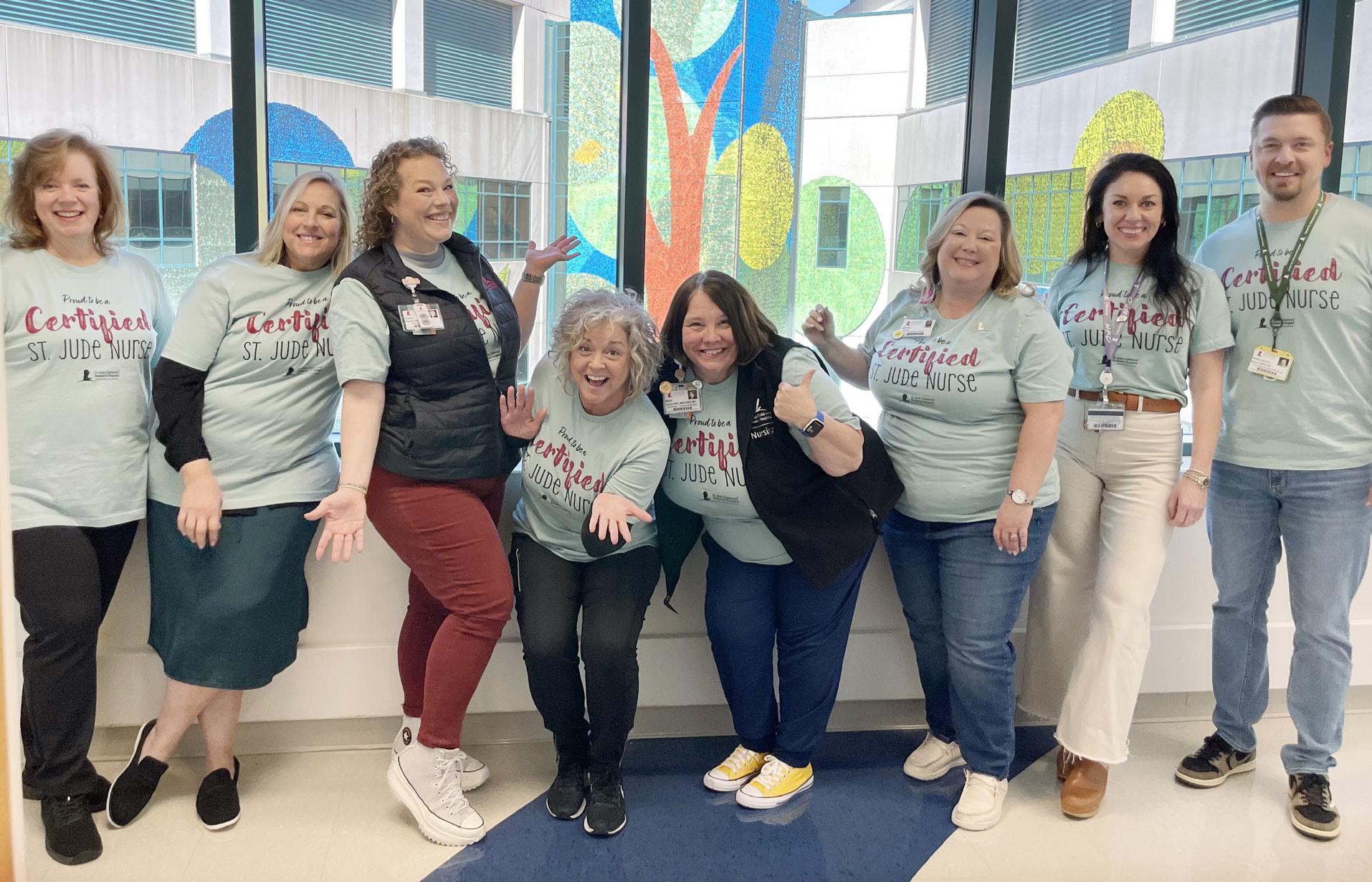

Nursing colleagues,
As we reflect on a year of St. Jude Nursing achievements, we must acknowledge it was also a time of change. I don’t think I was the only one who faced an important transition in 2023. Last year was certainly one of change for me, both personally and professionally. It was also a change for St. Jude Nursing, as I joined the team as your new chief nursing executive. I will be forever grateful for the warm welcome and the many personal greetings I received when I arrived.
This year’s annual report theme, “Advancing the foundations of excellence,” celebrates the accomplishments of our entire team and the many who serve with us. As you read through the coming report, you will see how our dedicated efforts and teamwork have helped us reach our goals. Clinical Excellence, in partnership with the council chairs, took time to restructure our nursing shared governance model, emerging with a more streamlined approach to avoid redundancy. We stood up our Magnet champion committee to serve as the cheerleaders for this prestigious work. We also opened our clinical command center in its new space and The Domino’s Village on-site clinic to better serve our families in housing.
In partnership with Global nursing, we had seven RNs from various parts of the world come to St. Jude to kick off the first global evidence-based fellowship cohort. Their projects span a wide range of improvement initiatives, and this would not be possible without the willing mentors within our nursing family who provide guidance. Our Advanced Practice colleagues achieved successful accreditation for their Transition to Practice Program, which is vital given the significant growth for that team.
One of the cultural traits I love about our Nursing community is that we take time to recognize so many milestones both big and small. From honoring our nurses at formal events such as the UTHSC Nightingala and our annual St. Jude Nursing Gala to more moderate celebrations for career ladder progressions, Certified Nurses’ Day and our Daisy Award Winners, we show up and support each other. We celebrate good catches for safety, and our senior nurses who provide a watchful eye over the whole team. These are just some of the many ways we celebrate the unique and lasting impact nursing has on our organization.
In the ten months since I started at St. Jude, I have witnessed the passion and dedication of our team. I am humbled and grateful for how we work together in support of each other and the precious patients and families we serve. Thank you for all you do every day to make an important difference in the lives of others. Looking ahead, I remain true to the commitment of creating a culture where we can all show up at our best— where it feels safe to learn out loud together as we find creative ways to solve our challenges. We have several great initiatives to focus on in 2024, and I look forward to the exciting work ahead as we continue to elevate St. Jude Nursing to the next level of excellence.
With gratitude,

Sarah Currie RNC, MSN, NEA-BC Senior Vice President Chief Nursing Executive


In April 2023, St. Jude embarked on an ambitious journey in collaboration with Florida-based health care consulting firm, BDC Advisors, LLC. The vision statement for this project was to create a best-in-class Clinical Command Center at St. Jude that continuously elevates the level of care, quality, and experience for patients, families, and staff while providing seamless access to coordinated and interdisciplinary care across the continuum. Engaging dozens of stakeholders from various disciplines across the organization, the project team set out to define future opportunities and goals. As the vision for the Clinical Command Center evolved, five overarching priorities began to emerge: (1) Patient and Staff Experience, (2) Operations and Clinical Impact, (3) Clinical Command Center Structure, (4) Technology, and (5) Collaboration. Stakeholders closely examined the activities underlying these priorities to ensure a thorough understanding of the Clinical Command Center’s core functions.

The quest to identify exemplary clinical command center models led to field visits, virtual visits, and remote discussions with other state-of-the-art command centers including Nemours Children’s Health, Children’s Hospital of Colorado, Cincinnati Children’s Hospital, Children’s Healthcare of Atlanta, and Cleveland Clinic, among others. BDC Advisors also conducted group interviews with stakeholders to identify and prioritize the processes integral to establishing the Clinical Command Center. The three key priorities selected for implementation during the first year include tiered emergency response, centralized staffing, and enhanced analytics that provide actionable insights.
In June 2023, just as the visioning phase for the Clinical Command Center was ending, nursing leadership recognized the need for continued collaboration with BDC Advisors in selecting the future Nurse Call System (NCS) and Real Time Location Services (RTLS) vendors. Driven by the new outpatient clinic building scheduled for completion in 2026, another visioning session in late June set the stage for defining guiding principles and strategies for the NCS and RTLS vendor selection process. To learn more about these systems and their capabilities, the team again conducted field visits, virtual visits, and remote discussions with organizations such as Mayo Clinic, Johns Hopkins, and Boston Children’s Hospital. Top-ranking vendors provided in-person demonstrations with the final selection of Jeron and Centrak as the preferred vendors for NCS and RTLS, respectively.
After defining priorities and selecting vendors, efforts in fall 2023 shifted toward building a robust team and setting up the Clinical Command Center space. Led by the Triad+ team, in collaboration with Design and Construction, Information Services, Facilities Operations and Maintenance, and Biomedical Engineering, the transformation of the space began. Centrally located on the second floor of the Richard C. Shadyac ALSAC Tower, the Clinical Command Center features cubicles, offices, and workstations, now serving as the centralized hub for clinical operations.
As news of the initiative spread, it became clear that the term “clinical command center” was causing confusion, with many mistaking it for an incident command center. To resolve this issue, Clinical Logistics organized a naming contest in December 2023, inviting suggestions from hundreds of employees. After a thorough selection process, the name “Hospital Operations & Patient Enterprise Center (HOPE Center)” emerged as the chosen name, reflecting the optimism and purpose underlying its mission.
As we look ahead, the Clinical Logistics staff and the HOPE Center are ready to meet the organization’s changing needs, enhancing both clinical and operational efficiency while prioritizing the holistic experience of patients and staff. With a phased timeline of five years, the initiative is set to bring about transformative change through a strategic framework of goals, priorities, and actionable steps.
The HOPE Center Triad+ team includes Nolan Eason, RN, director, Clinical Logistics; Austin Hudson, director, Clinical Operations; Lauren McMurry, RN, manager, Command Center Operations, Clinical Logistics; Carly Meredith, NP, APN, RN, manager, Advanced Practice Operations, Center for Advanced Practice; and Ray Morrison, MD, associate member, Critical Care Division chief, Pediatric Medicine.
Key personnel housed within the HOPE Center include Sara Barnes, RN, manager, Central Staffing, Clinical Logistics; Amanda Bowling, RN, manager, House Supervision, Clinical Logistics; Lauren McMurry, RN, manager, Command Center Operations, Clinical Logistics; Katrina Pennington, RN, manager, Care Coordination, Clinical Logistics; Rebecca Tafaro Boyer, RN, manager, Vascular Access Team, Clinical Logistics; the House Supervisor Team; and Clinical Logistics support staff. Together, this collaborative effort aims to simplify operations, improve patient care, and nurture a culture of excellence within the institution.
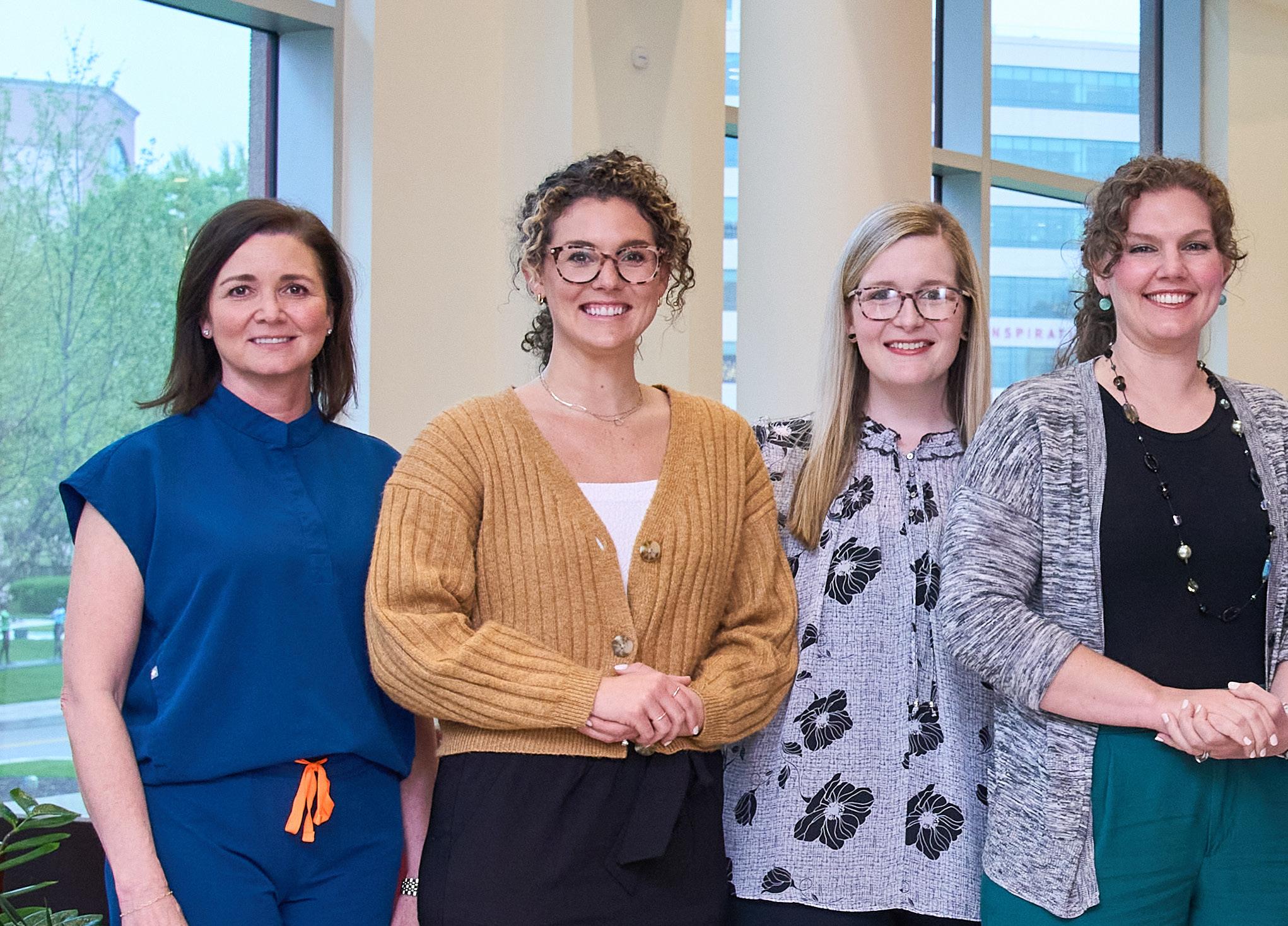
In 2023, nursing leaders identified the need to review and revise the orientation for clinical staff leaders (CSLs). CSLs are the direct supervisors of front-line nursing staff, and they report directly to nurse managers. The CSL role was developed and implemented at the cusp of the COVID-19 pandemic, and the original competency assessment tool did not clearly reflect the roles, responsibilities, and expected competencies that evolved since implementation. The tool also omitted critical health care personnel. During the July 2023 Nursing Leadership Team monthly meeting, the Department of Nursing Education and Professional Development garnered support to develop a task force to make necessary edits to the competency assessment tool to set up future CSLs for successful onboarding and enculturation into the role.
Nursing professional development practitioners led the task force, which consisted of nursing leaders from CSLs to directors with representation from each service line. It was vital to have representation from each area to ensure the competency assessment tool was applicable to
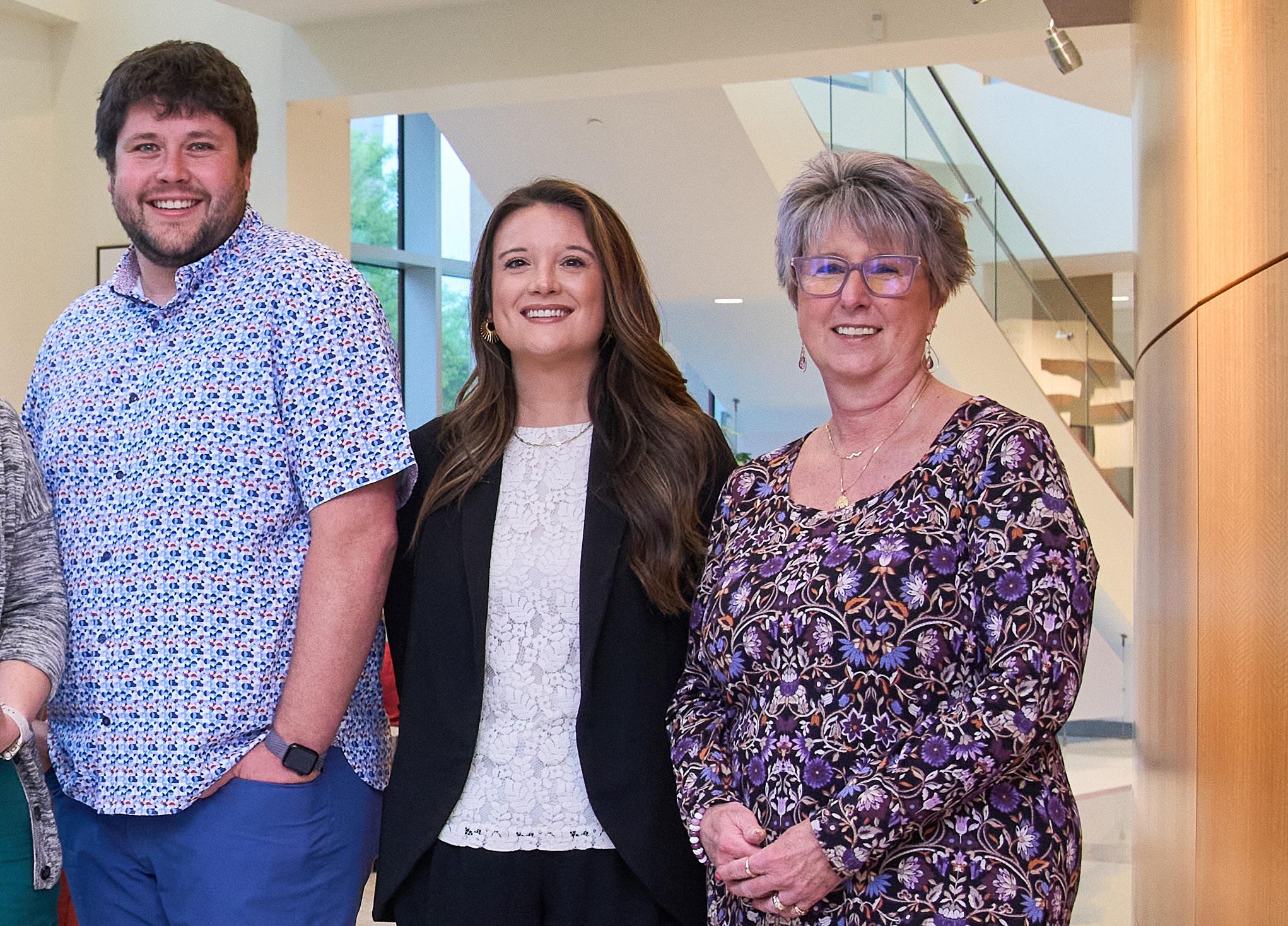
CSLs across the organization. This group met monthly to identify how the daily work of CSLs aligned with the American Organization for Nursing Leadership’s (AONL) Nurse Leader Core Competencies. The competencies include business skills and principles; communication and relationship building; knowledge of the health care environment; professionalism; and leadership. These five core areas are anchored by the “leader within,” which focuses on the individual leader’s personal development.
In addition to aligning the daily work to the competencies outlined by AONL, a gap that CSLs identified was connecting
with other health care leaders in and outside the Nursing department. The task force developed an “Around the World” experience, which outlines important leaders in and outside the Nursing department with whom CSLs often interact and collaborate. These groups include CSLs from other service lines, house supervisors, service line providers, operations managers, materials management, patient relations, risk management, regulatory, and more. With the implementation of the new tool, these revisions, and the addition of the “Around the World” experiences, new CSLs are better equipped to assume a front-line leadership role within the organization.
Since the beginning of the Magnet journey at St. Jude, a Magnet Champions group has been actively preparing the Nursing department for each site visit. The champions also contributed to enculturating the Magnet standards through creating bulletin boards, presenting at Shared Governance meetings, and embracing the theme for that designation.

Preparation for the October 2024 submission began in early 2023. Part of the preparation involved a discussion regarding the Magnet Champions and how to enhance this committee. A revision of the Shared Governance model was also being conducted at the same time. Many of the discussions revolved around the need to create a champions committee that is continuously engaged in incorporating Magnet principles into the Nursing culture. A decision ultimately was made to closely tie this committee to the Quality Council.
The new committee is a team of clinical nurses, advanced practice providers, nurse educators, and nurse leaders who will help enculturate Magnet standards into nursing practice. The aim is to foster clinical excellence in nursing practice and quality patient care delivery through education, awareness, readiness activities, and innovation, culminating in Magnet designation.
The functions of the committee include:
• Advance the culture of excellence through Nursing Shared Governance
• Enculturate the St. Jude nursing professional practice model through structural empowerment for optimal outcomes, new knowledge and innovation, research, expansion of evidence-based practice, and spread of transformational leadership
• Use principles of high-quality nursing practice to recommend evidence-based and datadriven care
• Identify and capture potential document narratives
• Participate in awareness campaigns, site visit preparation, rounds, professional development offerings, and other marketing initiatives
• Help build excitement and awareness for Magnet activities as a unit champion
• Work with unit- and unit-based council leaders to provide Magnet updates at staff and council meetings
• Serve as a communication liaison for all levels of nursing and interdisciplinary partners
• Provide communication to each assigned unit/area through newsletters, quality updates/ boards, recognition boards, and scholarly work (abstracts, posters, etc.)
The committee has had a great start. The group immediately approved a charter, selected a chair and co-chair, chose a logo and theme, and began preparations for creating Magnet display boards. Representatives from all clinical areas and nursing levels have contributed. Committee members have also connected with the Quality Council members from their areas to strengthen the connection between the two groups.
Next steps for the committee include helping to communicate the contents of the Magnet document submission and beginning preparations for the site visit. The group will also begin looking at opportunities for enculturation activities.
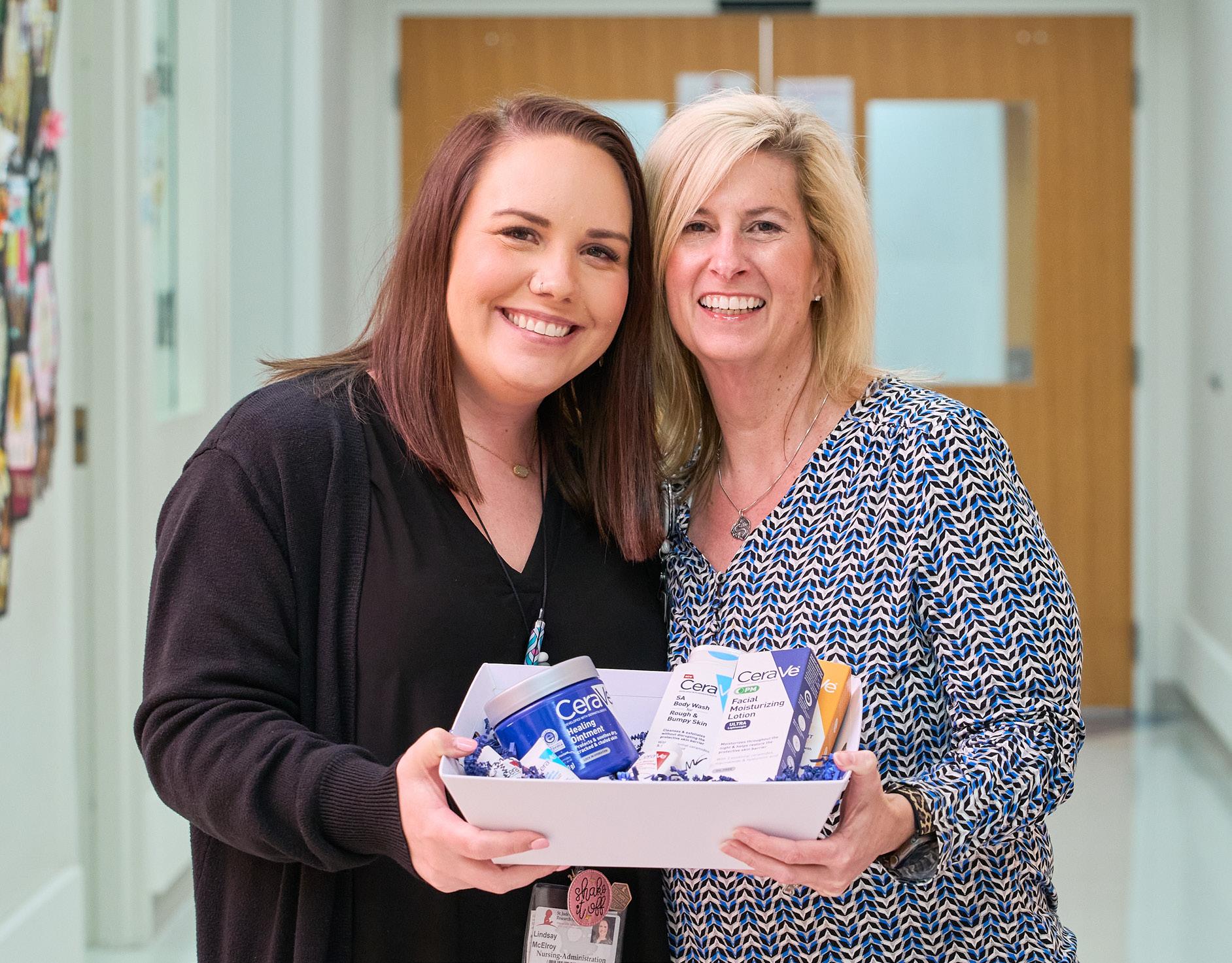
In a culture of wellness, organizational leadership support is important. It’s essential for employees to have access to resources for assessing and preventing job stress, leading a healthy lifestyle, contributing to a positive work environment, and administering safe patient care.
Burnout is the indicator most strongly correlated with nurse attrition, suggesting that a proactive approach of identifying symptoms of burnout and intervening early may reduce turnover. Additionally, nurses experiencing job stress are more prone to make errors and negatively impact the patient safety culture. Digital platforms such as apps have demonstrated effectiveness in providing practical and easy access to resources to help nurses manage stress and set wellness goals. Like those at many hospitals across the world, St. Jude nurses experienced an impact on their well-being due to the COVID-19 pandemic, as well as associated staffing shortages.
The Nursing Executive Team and the Healthy Work Environment Shared Governance Council launched a new burnout program. It’s endorsed by the American Nurses Association and provides a digital platform to help prevent burnout at the organizational level and equips individual nurses with tools and strategies to prevent burnout.
In April and May 2023, nurses completed a survey in which they were asked to voice their top stressors. At the survey’s completion, nurses gained immediate access to the Program Enrichment Center link on the Nursing Intranet Hub. The Enrichment Center is a library of articles, videos and audio content on topics including burnout basics, self-care, work life balance, interpersonal relationships, leadership skills, coping techniques, well-being strategies, meditation and more. The platform is built on a framework of continuous improvement, which allows us to measure, analyze, improve, control, and remeasure valuable data points that drive organizational decisions. Nurses can individualize their well-being care plan and claim continuing education credits (CEUs). At the survey’s conclusion, more than 50% of nurses and leaders responded. More importantly, nurses had accessed more than 280 videos to help alleviate stress and burnout.
Nurses continue to have 24/7 access to the Nursing Burnout Prevention Program on the Nursing Intranet Hub. To demonstrate commitment to our patients and nurse excellence, the Healthy Work Environment Council promotes helpful videos through quarterly contests. The council suggests four topics relevant to top stressors identified by staff. Individuals who complete the videos and claim CEUs are entered into a drawing to win a CeraVe Deluxe Skin Care basket. By the end of December 2023, over 730 nurses accessed 782 videos and claimed 456 CEUs.
Nurse feedback included comments such as:
• “Videos are a great way for me to learn, thankful for them.”
• “Yes! So informative yet short enough to watch a few on a break at work!”
• “Gave me quick simple ideas. Great solutions given for issues.”
• “It was very helpful content and spot on with what I struggle with. The readings are excellent.”

In January 2022, the Nursing Surgical Services Peri Anesthesia Team split into two teams to better serve patients and families in both Diagnostic Imaging and Radiation Therapy. The team felt each area had outgrown the current staffing model, and each area needed to have a clearer focus to deliver safe, high-quality patient care. This split moved half of the staff to the Proton level for the bulk of the eight-hour shift. Due to the split, the Radiation Oncology (RO) Peri Anesthesia Team did not have a designated space near their patient care responsibilities to work on projects/ committees, have confidential patient conversations, or securely store personal belongings without violating regulatory standards.
In March 2023, the nurses found that a workroom would benefit nurses’ well-being by reducing stress and providing a dedicated space where nurses could focus on non-patient care work. Literature suggests that a designated quiet space near the nurses’ station reduces the fatigue and stress that can negatively impact workplace safety, quality of patient care, and overall job satisfaction.
Nurses also needed this space to complete educational and professional activities related to committee work and projects. Many RO Peri Anesthesia nurses serve on hospital committees, participate in quality projects and research, and develop educational information to improve patient care and nursing knowledge. In addition, all staff participate in web-based and continuing education training throughout the year. This requires time on computers in a private and secure space away from patients and families, but options were limited.
In February 2023, Madolyn Maupin, BSN, RN, CAPA, CPAN, a clinical staff leader, began investigating available space in the RO Proton PACU that might be a good fit for a workroom. She identified a nearby space that would allow easy access their patient care responsibilities and meet the unit’s needs.
In June 2023, Maupin worked with Michele Pike, MSN, RN, NE-BC, nurse manager, NSS, and Maris Brown, MHA, CSSGB, director of accreditation and quality systems, Office of Quality and Patient Safety, to continue advocating for the workroom space. Maupin, Pike, and Brown advocated for reallocating the space by seeking approval from the multiple departments that were invested in and utilized the space including assistance from the Chief Nurse Executive.
In August 2023, the RO Peri Anesthesia workroom officially opened. Staff feedback has been overwhelmingly positive, and the room is used often. The noise level in patient areas has also improved now that nursing staff have a separate place to work on projects and committees.
The advocacy of Maupin, Pike, and Brown for the RO Peri Anesthesia staff led to improvement in nurse well-being by providing a dedicated, quiet and secure workspace that is easily accessible to RO Peri Anesthesia nurses. Nurses are now able to take a quick moment for mental clarity, focus on non-bedside tasks, and still be accessible when needed.
This new place to work on projects, committees, educational activities, and other professional activities gives nurses a voice in their practice and empowers them to achieve personal career development goals.
Nursing Shared Governance provides a culture that empowers all registered nurses to demonstrate ownership of nursing practice, processes, and systems based on evidence that exemplifies organizational values to provide optimal patient outcomes, contribute to interprofessional decision making, and benefit nursing at every level. Nurses at St. Jude have participated in shared governance for almost two decades, and the structure has been periodically updated based on nursing best practices as well as organizational growth and strategy.
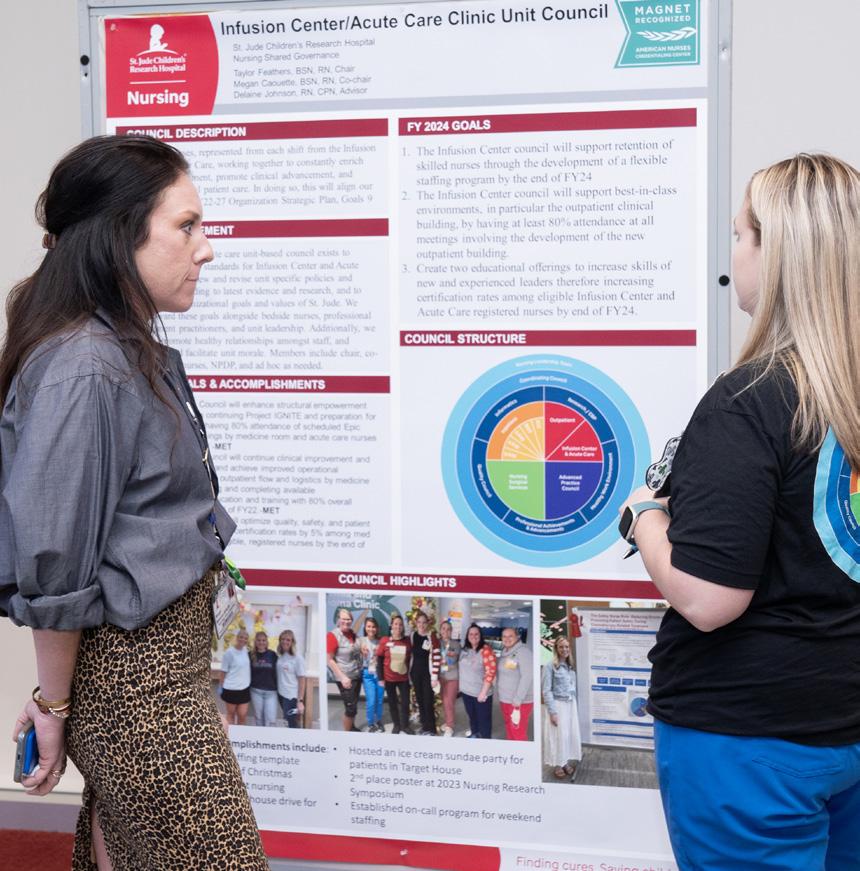
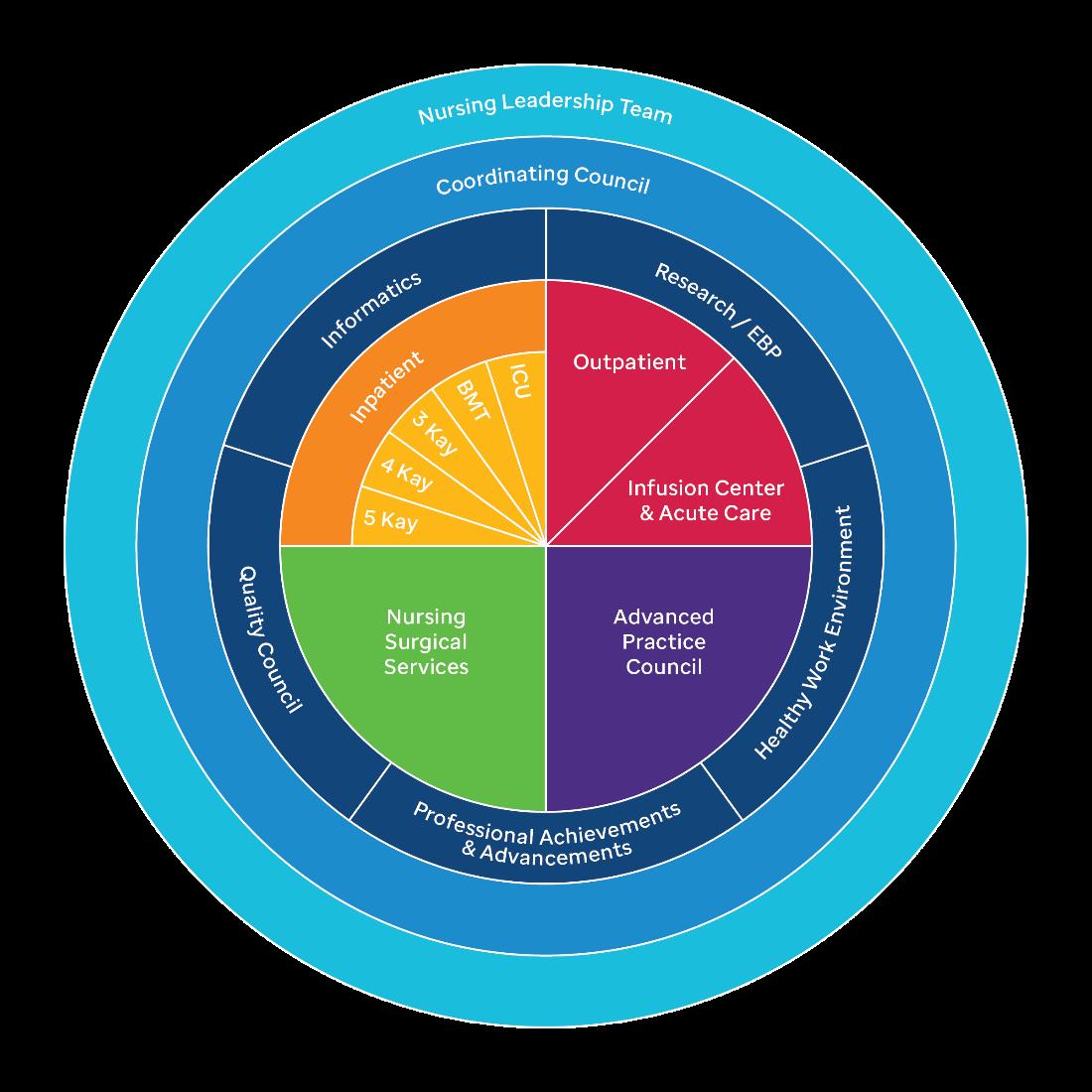
At the annual Shared Governance strategic planning meeting in March 2023, the council chairs, co-chairs, and nursing leaders participated in an exercise to evaluate the current structure and brainstorm what should change to best position our Shared Governance Councils to support our strategic goals. Feedback was provided from participants on what was working, what should be changed, and what should be eliminated. At the end of the day, a design team consisting of current shared governance members was commissioned to design the next iteration of Nursing Shared Governance. The design team’s aim was to simplify the ability for anyone in nursing to access, engage, sustainably participate, and have influence over nursing practice by way of our shared governance system. The team presented its recommendations at a follow-up retreat in June.
In April and May, the Nursing Shared Governance Design Team, led by Lindsay McElroy, MSN, RN, CCRN, CNL, NE-BC, Nursing Clinical Excellence program manager, and Nancy Ballinger, clinical project manager, worked with design team members representing all areas of nursing clinical practice to determine the best course of action based on the literature, best practices, and St. Jude nursing strategic needs. After weekly meetings with robust discussion and input from key stakeholders, the redesign proposal was endorsed by the Nursing Executive Team and ready for debut at the June Shared Governance retreat.
At the retreat, the design team presented the new shared governance model and recommended bylaw changes. The chairs, co-chairs and nursing leaders approved the new structure to start with the new fiscal year on July 1. A schedule of new continuing education opportunities for chairs and co-chairs was presented to support the success of the new structure.
On September 26, 2023, the first Shared Governance Fair was held in the Marlo Thomas Center Board Room. Over 200 people from across St. Jude attended the come-and-go, multidisciplinary event. All shared governance councils prepared a research-style poster to display their previous and current goals, council mission statement, and any other pertinent information regarding their council’s achievements. Attendees were invited to peruse the posters and interact with shared governance officers, who were present for the whole event.
Overall, the new shared governance model’s aim was to streamline the process by which nurses can impact nursing practice. With significantly less councils from the previous model, the new shared governance model takes the guesswork out of where to take certain initiatives. For the future, nursing leadership continues to monitor and evaluate the effectiveness of the new shared governance model. Nursing practice is fluid and ever-changing, and therefore, the structures supporting nursing must be able to do the same.

• Lindsay McElroy, MSN, RN, CCRN, CNL, NE-BC, Nursing Clinical Excellence Shared Governance program manager
• Nancy Ballinger, clinical project manager for the Nursing Executive Team
• Katie Tomaszczuk, BSN, RN, CPHON, BMTCN, and Sarah Dodd, BSN, RN, CPHON Inpatient Nursing
• Maegan Traynom, MSN, MA, RN, and Shelby Steinman, BSN, RN, Outpatient Nursing
• India Smith, BSN, RN, Surgical Services
• Anna Baker, MSN, APN, CPNP-AC, and Emily Denton, MSN, CPNP-AC, Center for Advanced Practice
• Troy Wallach, MPA, BSN, RN, CPHON, from the Float Pool, Clinical Logistics
• Grace Dormois, BSN, RN, CPHON for NSS

The Professional Achievements and Advancements Shared Governance Council assesses, develops, implements, and oversees activities to celebrate and honor those in the nursing profession. Recognitions include the DAISY Award, national Certified Nurses Day, Nursing Care Team Week, the annual Nursing Gala, clinical advancement, and more.



The DAISY Award for Extraordinary Nurses is an international nursing award created to honor nurses all year long for the extraordinary and compassionate care they provide. A St. Jude parent wrote, “DAISY Award honorees personify the remarkable patient care experience at St. Jude. These nurses consistently demonstrate excellence through their clinical expertise and extraordinary, compassionate care. They are recognized as outstanding role models in our nursing community.”
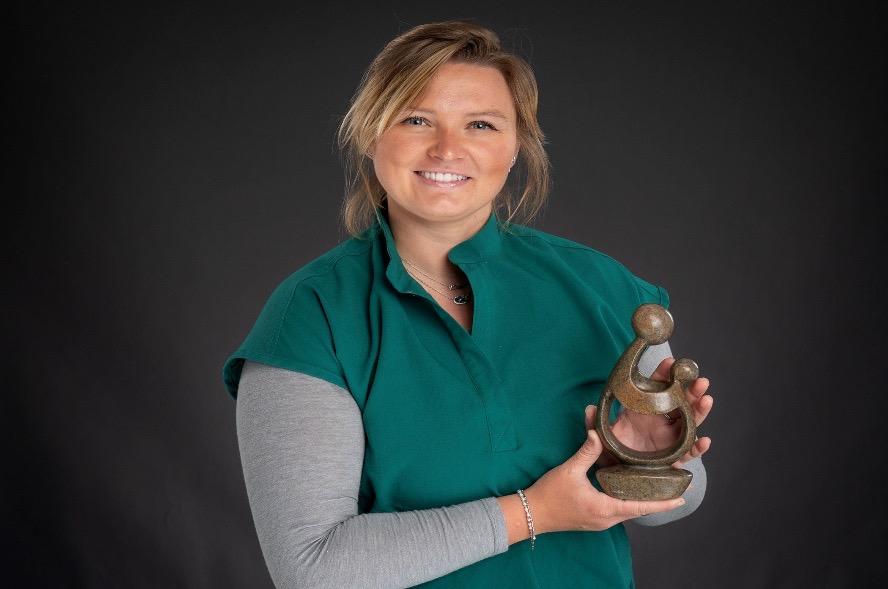
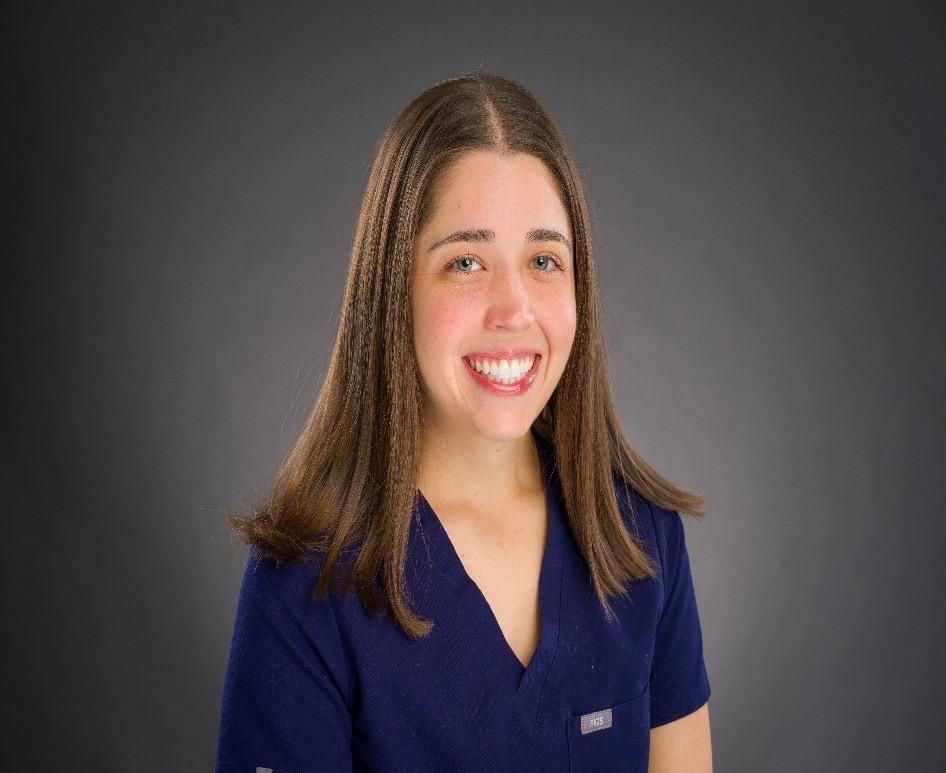


In March 2023, Nursing celebrated the accomplishments of specialty certified nurses on national Certified Nurses Day. The literature shows specialty nursing certification has a positive impact on patient care, patient safety, higher RN job satisfaction, and turnover rate. Certified nurses exemplify professionalism, dedication, expertise, and service to Nursing and our patients. St. Jude supports certifications by providing reimbursement for exam and renewal fees, study materials,
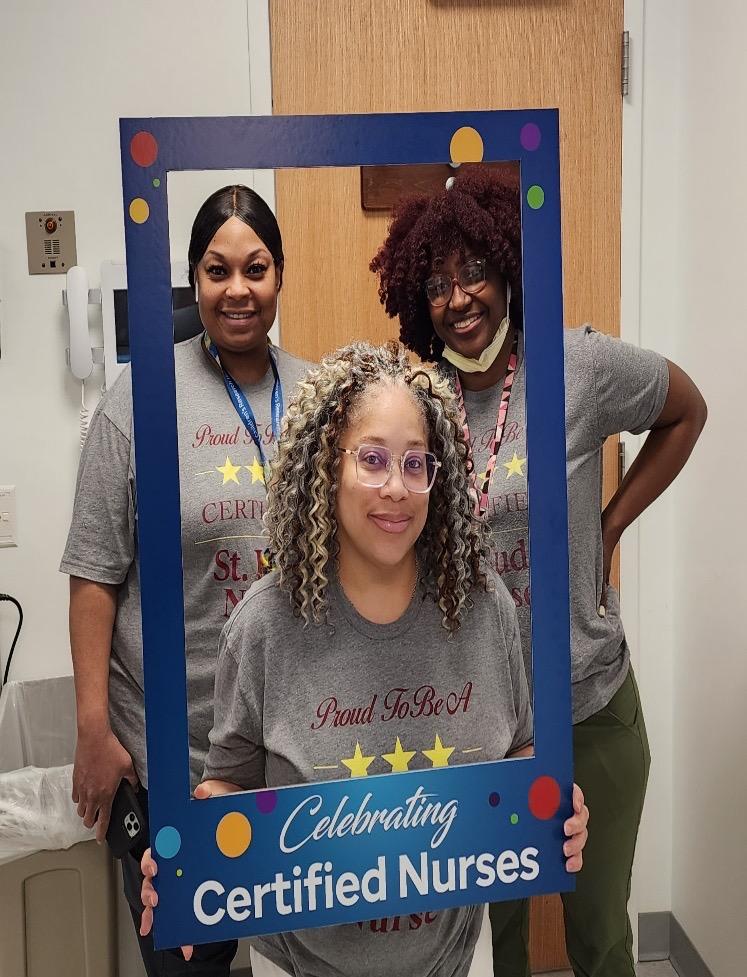
Photo selfies of nurses in their certified nursing T-shirts were featured in The Pulse nursing newsletter and displayed on the Nursing Hub and Nursing Recognition Wall.
In May 2023, St. Jude Nursing partnered with the University of Tennessee Health Science Center College of Nursing to promote and sponsor the 2023 UTHSC Nightingala Hero Awards. This event involved the celebration and recognition of nurses across the community.
St. Jude nurses receiving Nightingala Hero awards nominations included:
• Aubrey Pepper, MSN, RN, CNOR, NE-BC, Executive Leader Nurse Hero
• Lindsay Kaiser, BSN, RN, Bedside Nurse Hero (2023 UTHSC Award recipient)
• Yvette Humphrey, DNP, PMHNP-BC, FNP-BC, Advanced Practice Nurse Hero
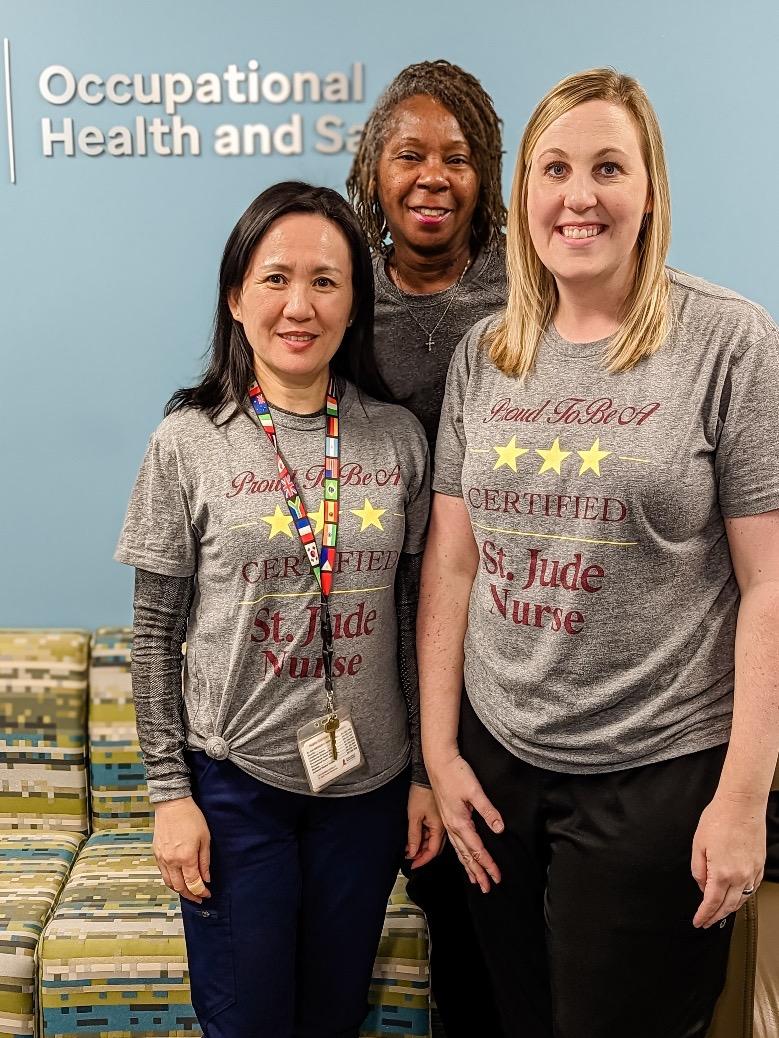
For Nursing Care Team Week, St. Jude Nursing offered several activities and incentives including Blessing of the Hands, loaded teas, massages, and gifts. Nurses also participated in dress-up days with themes including Superheroes, Favorite Kid Show, School/Sports Spirit, Disney, and Eras/Decades. To close out 2023, Nursing leadership hosted the annual Nursing Gala at the historic Peabody Hotel in downtown Memphis. Nursing recognized seven award recipients with Nurse of the Year; Nurse Leader of the Year; Advanced Practice Provider of the Year; Diversity, Equity, and Inclusion Nurse of the Year; Nursing Team Award; Friend of Nursing; and the BEE Award.
2023 Nursing Gala Recipients were:
• Katie Tomaszczuk, BSN, RN, CPHON, BMTCN, Inpatient Services: Nurse of the Year for outstanding achievement as an ambassador for Nursing Excellence
• Casey Long, BSN, RN, CPHON, CNML, Outpatient Services: Nurse Leader of the Year for a leader who embodies the St. Jude values while making an impact in the area or programs in which he/she leads.
• Gina Sabbatini, PA-C, AAHIVS, Infectious Diseases: Advanced Practice Provider of the Year for outstanding achievement as an ambassador for Nursing Excellence
• Elizabeth Davis, BSN, RN, CPN, CPHON, Infusion Center: Diversity, Equity, and Inclusion Nurse of the Year for outstanding achievement as an ambassador for Nursing Excellence
• Procedures Team, Nursing Surgical Services: Nursing Team Award for outstanding achievement as a team of ambassadors for Nursing Excellence (Angel Alexander, BSN, RN; Connie Williams, CSL, BSN, RN, CPN; Loren Roberson, BSN, RN, CPHON; Danielle Wright, BSN, RN, CPHON; Mary Morgan Johnson, BSN, RN, CPN; Grace Dormois, BSN, RN, CPHON; Kelsey Carlton, BSN, RN, CPHON; Lisa Laminack, BSN, RN, CPN; Lou Ann Griffin, BA, ADN, RN, CPN; Tony Tiscia, BSN, RN, CPN, CAPA, CPAN; Julie Waldrip, BSN, RN, CPN; Kristin Nix, BSN, RN, CPN; Brittany Queen, BSN, RN; Rasheedol Fields, PCA; and Claudine Kirkwood, PCA)
• Lizzie Digiovanni, BMus, MT-BC, Music Therapist, Child Life Program: Friend of Nursing for outstanding support and empowerment of Nursing Excellence
• Aisha Davis, Nursing Care Attendant, Outpatient Services: BEE Award for outstanding support and empowerment of Nursing Excellence
Other 2023 honorees included:
• Jami Gattuso, RN, Nursing Research, recipient of the Dr. Cheryl C. Rogers Excellence in Evidence-Based Practice Award who was inducted as a Fellow of the Association of Pediatric Hematology/Oncology Nurses (Presented at the 2023 Annual Association of Pediatric Hematology/Oncology Conference)
• Carist Neal, administrative coordinator, Center for Advanced Practice, named a Living Our Values honoree (Recognized for St. Jude Value No. 2: Do what is right; take ownership of what you do)
• Christopher Spencer, RN, Nursing Advisory Council chair, and Suzette Stone, APN, RN, Superuser Program director, recipients of the St. Jude Clinical Care Improvement Award presented to the clinician or group who has most significantly improved patient care (Recipients included the entire EPIC Implementation Team.)
• St. Jude Patient Family-Centered Care Award recipient Laura Poteet, Infusion Center, received the Jim Mobley Partner in Excellence Award
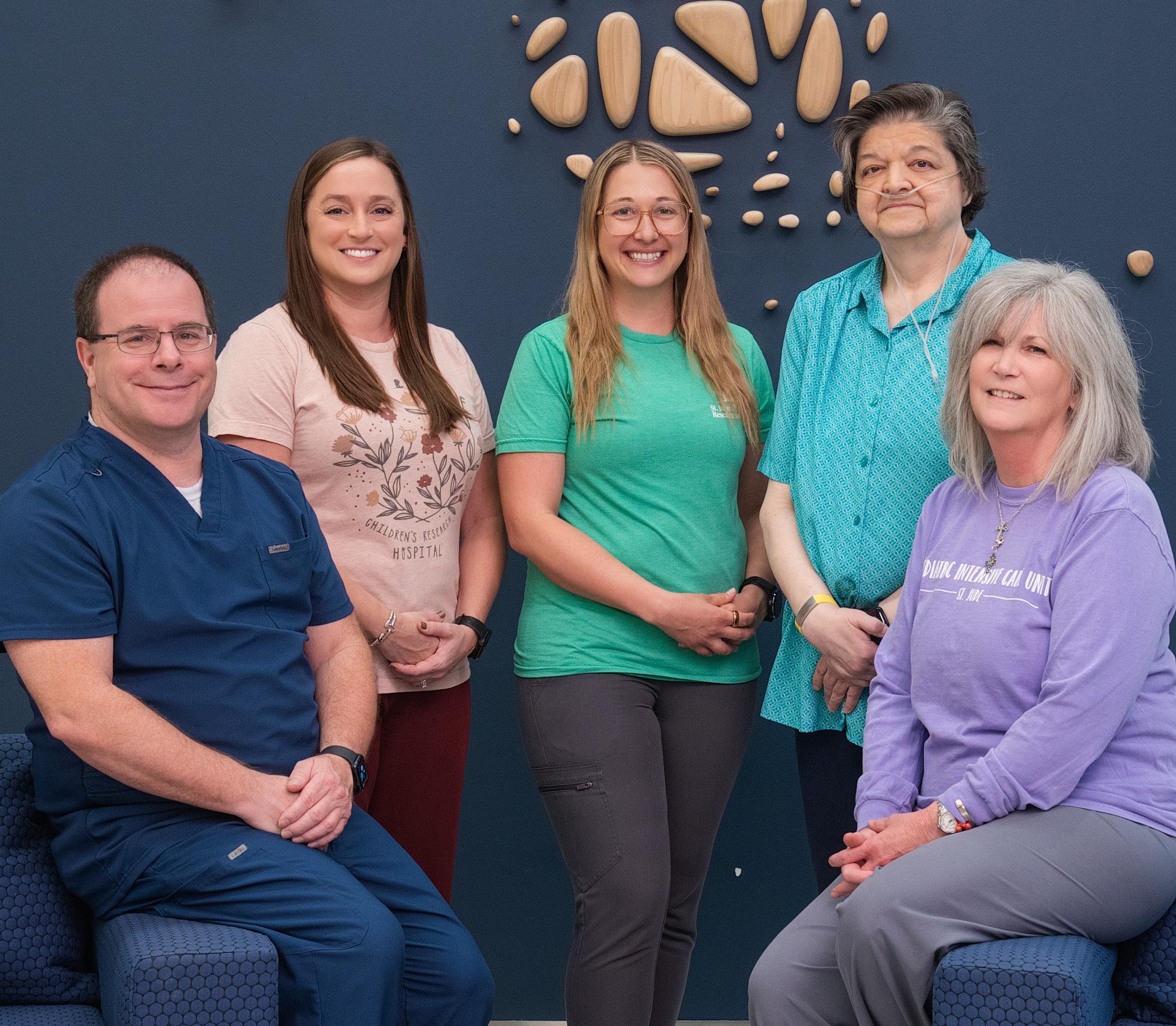
Clinical Advancement Programs (CAP) are important for retention and employee satisfaction. Evidence shows that nurses with graduate degrees in a health-care related field provide advanced critical thinking and decision making and have skills that improve patient care when they remain in bedside nurse roles. While the literature supports an addition to CAP ladders specifically for graduate degrees, a gap in getting these into fruition exists nationally.
In 1990, St. Jude Nursing launched a clinical ladder program consisting of four levels for bedside RN advancement. In 2009, a fifth level was added for promotion opportunity for bedside nurses with graduate degrees (PON 5). When CAP was redesigned in 2018, the graduate PON 5 level change was stalled until a robust program revision could occur.
In January 2023, Emily Nichols, RN, and Katie Tomaszczuk, RN, gathered a team of stakeholders comprised of Nursing leaders and current PON 5 nurses to begin the redesign. Desiring a strong, sustainable program, the team recognized an opportunity for better alignment between the current CAP Plus ladder and the developing Advanced Practice Practitioner (APP) ladder. Suzette Stone, APN, RN, senior director of nursing, Center for Advanced Practice, and Rachel Turner, APN, RN, APP operations manager and CRNA manager, shared the aspects of a strong APP program that aligned with the CAP advancement to create a fair, tenable program rewarding and promoting nurses with a graduate degree who intend to stay at the bedside. The PON 5 level was renamed to PON Advanced to highlight the advanced degree and contributions required to obtain the promotion.
The CAP Advanced program provides a choice of six tracks for promotion to PON Advanced: transformational clinical practice, community service, quality improvement science, research, institutional practices, and knowledge translation. The clinical tracks allow a nurse at the bedside to demonstrate work that contributes to the nursing and institutional strategic plan and improves nursing practice and patient care. Maintenance of the promotion was also improved to include a project planning form and a professional accomplishments tracker to better capture the contributions of a PON Advanced nurse.
In September 2023, the CAP Advanced program was endorsed by Nursing Leadership and socialized with Nursing. Three nurses received a CAP Advanced promotion through application, and three transitioned from the PON 5 position to PON Advanced. Their contributions to nursing excellence included improving patient education, optimizing medication safety, enhancing the admission and discharge process, increasing resources for nursing certification, and leading protocol work groups.

St. Jude pediatric clinical nurses complete training in administration of chemotherapy and biotherapy using standards set by the Association of Pediatric Hematology/Oncology Nurses (APHON) to develop competence in administering cancer therapies and monitoring a patient’s response. Children with high-risk neuroblastoma receive intensive multimodality therapy to eliminate any residual tumor cells. Treatment includes intravenous infusion of dinutuximab (Unituxin), a monoclonal antibody administered for four consecutive days.
The Solid Tumor/Neuro-Oncology Protocol Workgroup is a team of clinical nurse experts who create cancer treatment protocol-tailored care guidelines and education for nurses based on APHON standards. The workgroup conducts chart reviews for quality assurance with the objective of improving practice and minimizing medication errors. Metrics include average infusion time for medications, number of infusion times that exceeded the protocol timeframe, and documentation of reasons for deviation from the protocol.
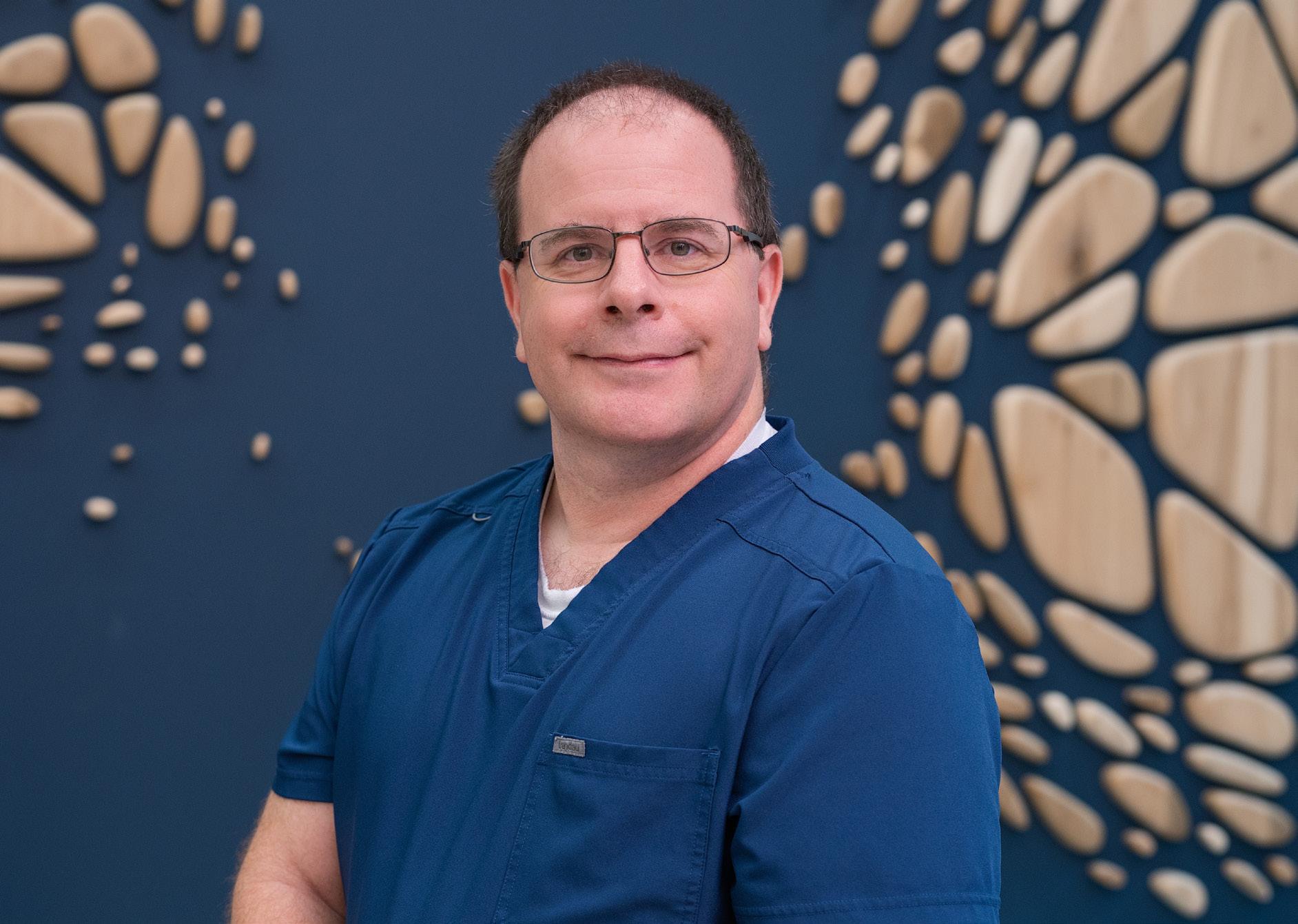
Adam Funk, MSN, RN, CPN, CPHON, PPCNPBC, clinical nurse on Kay 5 and chair of the Solid Tumor/Neuro-Oncology Protocol
Workgroup learned about two cases where an infusion of dinutuximab exceeded the protocol-specified maximum infusion time of 20 hours. Typically, it runs over 10 hours. Funk realized that variance from a prescribed infusion length represents a medication error. While the nurse may slow the infusion rate if the patient experiences side effects, the infusion must finish within 20 hours due to drug stability. Funk followed up with Kay 5 nurses who provided valuable insights into the variance from the dinutuximab treatment protocols. The nurses thought the priority was for the patient to receive the complete dose. They were not aware of the concern about dinutuximab instability after the 20-hour infusion time.
Funk and the workgroup reviewed the elements of the APHON chemotherapy safety standards for ordering, preparing, dispensing, and administering dinutuximab. The group identified gaps in the current knowledge. The group consulted with colleagues across multiple disciplines including nurse educators, research nurses, and pharmacists to establish electronic medical record order sets, develop education reinforcing safe infusion practices and maximum dinutuximab infusion time, and hand off tool revisions to ensure consistency of information to avoid error in time calculations.
Leveraging his pediatric hematology/ oncology expertise and the APHON safety standards, Funk led the workgroup and Kay 5 clinical nurses through a change in practice for dinutuximab infusions that improved the dinutuximab infusion medication error rate and patient safety.
As our Nurse Residency Program continues to grow and evolve to meet the needs of our new graduate nurses here at St. Jude, it was soon found that the program needed the influence of the work being done at the bedside by our unit staff. In 2023, the Nursing Education and Professional Development team formed the Nurse Residency Program (NRP) Advisory Board to fill that gap between bedside care and nurse residency program development.
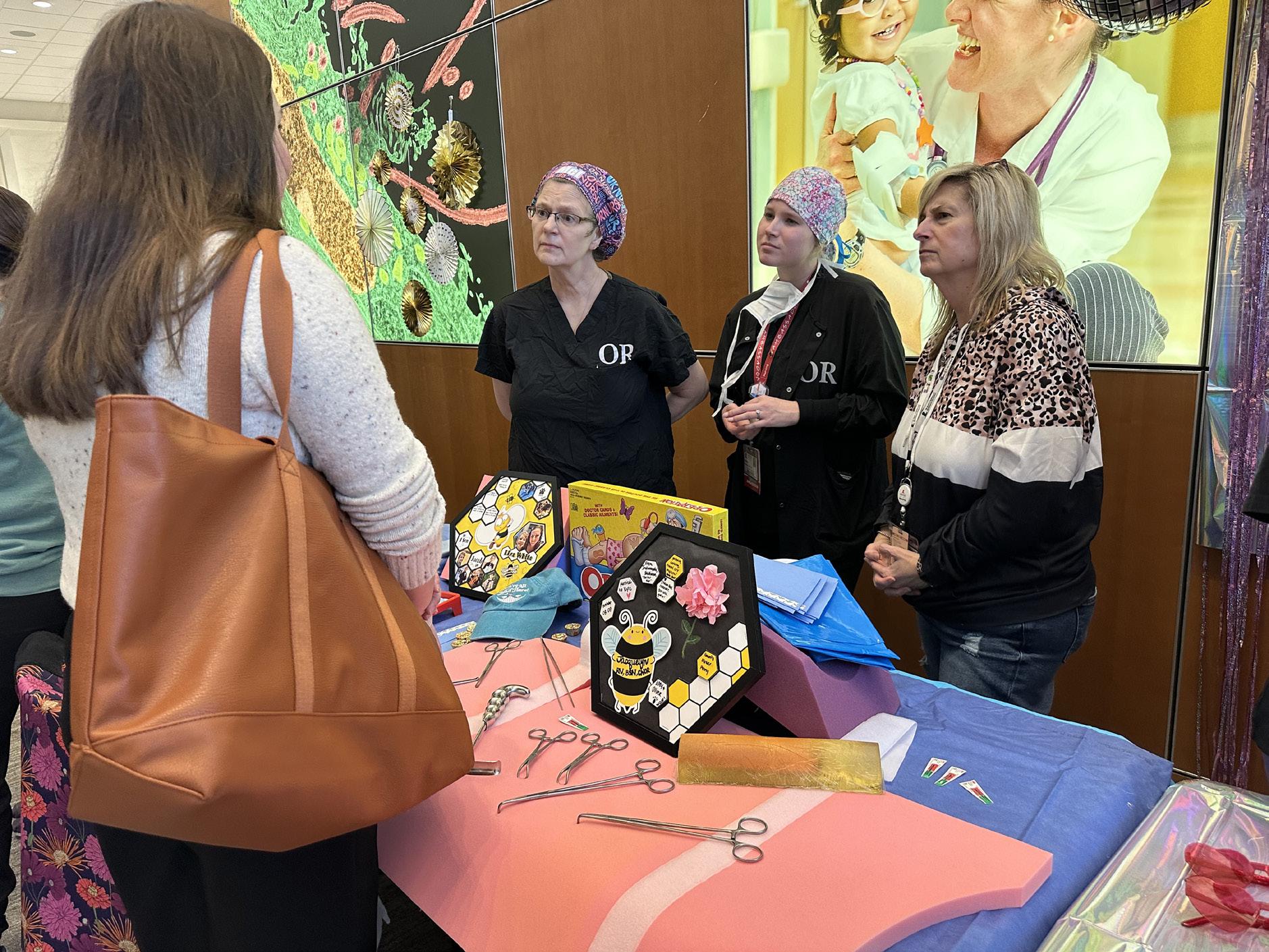
The NRP Advisory Board is a committee in which members model positive influence, spread awareness, provide support, and acquire resources for new graduate nurses and the nurse residency program. By bringing multiple departments, unit staff and leaders together, this committee serves as a voice for the program in collaboration with our Nursing Professional Development and Education team. NRP Advisory Board members include unit CSLs, preceptors, and past and current nurse residents who meet monthly to discuss topics such as new graduate skill development, preceptors, residency session content and presenter opportunities, clinical rotations/ambassador communications and the matching process. The advisory board allows our bedside experts to come together for critical decision making and advancement for the program.
The advisory board has already made a significant impact on the program through multiple creative ideas that support new graduate nurses.
Examples include:
• A skills bootcamp week to further prepare new graduates for unit orientation
• A hematology/oncology terminology course before clinical rotations
• The Unit Welcome Fair
The Unit Welcome Fair was sparked from discussion about how to further introduce new graduate nurses to the variety of nursing care provided at St. Jude. Historically, we have hosted a meetand-greet with nursing unit managers and new residents on their first day at work. It was noted that this process could be intimidating for new graduate nurses, and it also did not give units an opportunity to showcase their work. The Unit Welcome Fair was a true fair-style mentality in which the residents could visit each unit and learn more about the team, patient population, and nursing care provided. The fair was hosted in the Marlo Thomas Center Atrium, and each unit decorated a booth and offered posters, handouts, snacks, and treats to the residents. The unit manager, advisory board member, and multiple staff representatives visited each booth. Nurse residents visited the space and had time to talk to each unit and make initial connections with staff and the nursing care before kicking off clinical rotations.
This was the first time that nursing units have been able to highlight their teams and the care they provide to our patients and families. The units were allowed to get creative and think outside the box on how to showcase their work while establishing initial relationships with nurse residents. The success of the Unit Welcome Fair demonstrates the value of the bedside nurse’s involvement within the Nurse Residency Program and aligns with our program mission to produce graduates who are prepared to lead the advancement of nursing care.

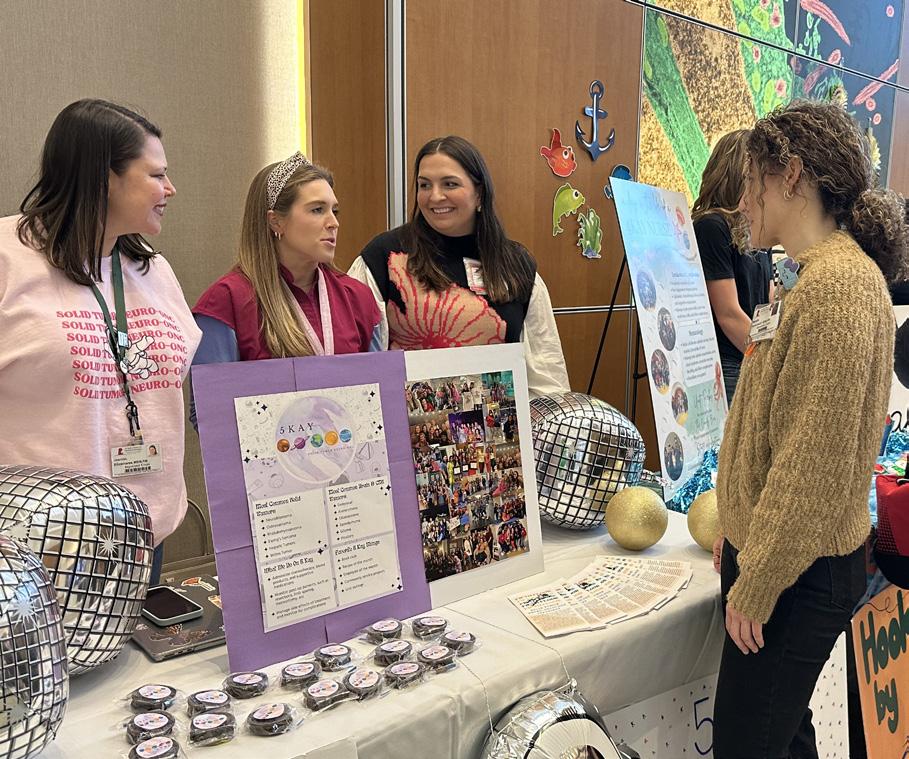
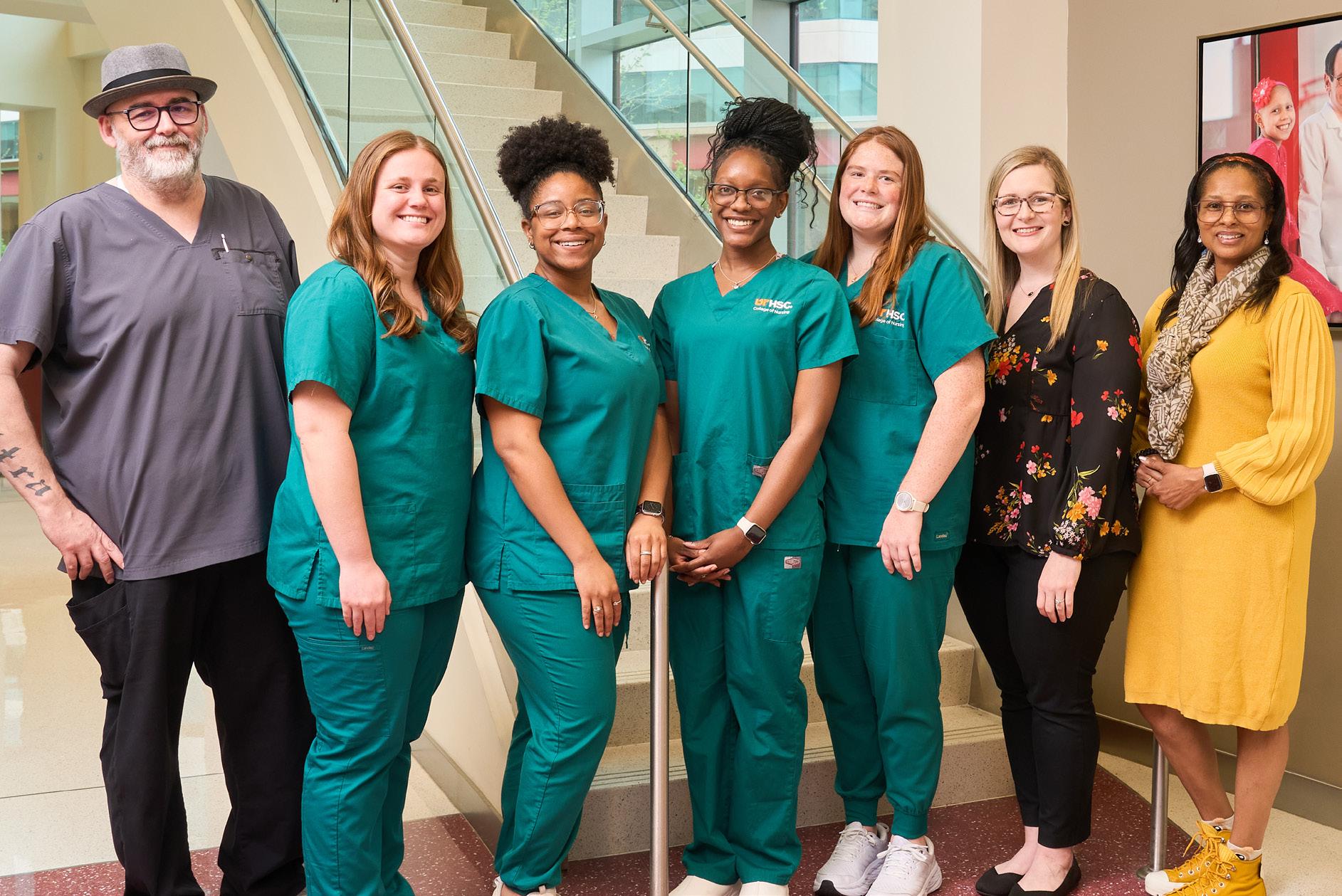
Following a two-year hiatus due to the COVID-19 pandemic, the Student Management Program reopened in 2023 with the mission to enhance the pipeline for highly qualified nursing staff and bring the best and brightest to St. Jude.
This program, facilitated by the Nursing Professional Development (NPD) team, creates clinical experiences for both undergraduate nursing students seeking a Bachelor of Science degree (BSN) and graduate students seeking Advanced Practice Provider (APP) degrees or other advanced degrees such as a master’s (MSN) in Nursing Leadership, Nursing Education or Nursing Informatics.
The Clinical Observation Program is an extension of the Student Management Program and provides experiences for those interested in nursing as a profession or obtaining a nursing position at St. Jude. Cayla Edwards, MSN, RN, CPHON, nursing professional development specialist, and DaMaris Pulliam Heidelberg, BPS, program coordinator, oversee the program. They strive to create robust experiences for students and expand partnerships with both local and non-local academic institutions with the goal of creating an effective pipeline of nurses for the organization.
The Student Management Program has academic partnerships across the country, allowing students to be exposed to a worldclass clinical setting in pediatric hematology and oncology. To build collaborations, the Student Management team attended career fairs and community outreach events and promoted the program through various communications. The team has begun to partner with Historically Black Colleges and Universities (HBCU). Through this partnership, they will contribute to the St. Jude strategic plan by integrating diversity, equity, and inclusion (DEI) strategies that enrich the hospital’s culture.
In 2023, the Student Management Program hosted 106 BSN students, 33 APP students and 14 MSN students throughout their clinical rotations. The BSN students experience various areas across nursing including Inpatient, Outpatient, and Nursing Surgical Services. Guidelines have been created to guide the student’s rotation with tasks they are eligible to complete to meet their course objectives. Current employees submit preceptorship requests to the NEPD department for facilitation of pairing with a preceptor. The Student Management team seeks preceptors who will meet the students’ objectives throughout their rotation and foster a well-rounded experience for the students.
As BSN students complete their clinical rotations, they meet with the Transition to Practice Manager, Annabeth Davis. She presents them with information about the Nurse Residency Program and the Nurse Externship Program. The Student Management Program fosters an avenue for students to transition into their nursing practice and feel supported through the process.
This program fits into our larger effort to create an effective pipeline for St. Jude nurses. Comprehensively, this program includes clinical observers, academic partnerships, externships, and clinical experience for master’s-prepared students who will become St. Jude leaders. This important part of the pipeline helps us create the future generation of St. Jude nurses.
Starting a career as a nurse practitioner or physician assistant can feel overwhelming.
In September 2021, the Center for Advanced Practice (CAP) started a Transition to Practice program for all newly hired Advanced Practice providers (APPs). The yearlong program includes multiple phases to optimize learning and training to ease new graduate APPs into their role.
Desired competencies were selected and designed for each department to guide managers, preceptors, and mentors as learners continue to build their clinical knowledge and skills.
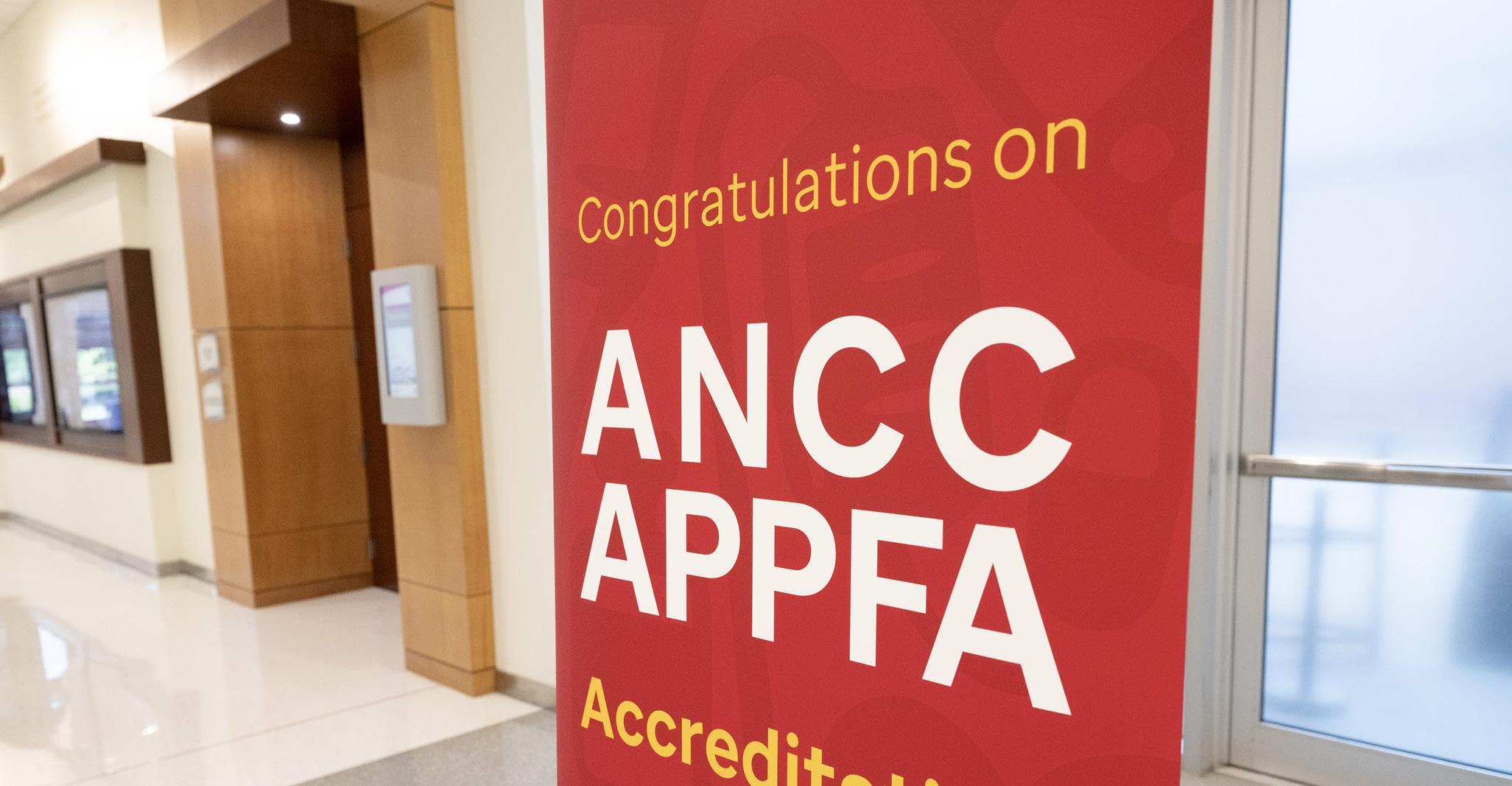
To have some fun, CAP conducted a naming contest for the fellowship program. The winning name was EVOLVE, an acronym for “Encourage-Validate-Optimize-Learn-Verify-Educate.”
In 2023, the American Nursing Credential Center (ANCC) launched an Advanced Practice Providers Fellowship Accreditation (APPFA) for fellowship programs that had proven track records for at least two years. CAP applied for the accreditation status in October 2022 and was accepted to move through the evaluation process. In February 2023, we submitted a comprehensive document that showed our program met or exceeded national standards in program leadership, practice-based learning, development and design, and organization enculturation. In addition, Advanced Practice fellows participated in an ANCC APPFA survey to measure the learners’ experience. The final step occurred in March 2023 with a virtual site visit from the ANCC APPFA program leadership. The site visit consisted of interviews with program leaders—Suzette Stone, PhD, PPCNP-BC, NEA-BC; Tonya Ureda, MSN, FNP-BC, NE-BC; and Patti Pease, MSN, FNP-BC— along with EVOLVE AP fellows, preceptors, managers, and mentors.
In May 2023, we received a phone call from the ANCC APPFA leadership to deliver the news that the St. Jude EVOLVE AP Fellowship was awarded the Advanced Practice Providers Fellowship Accreditation (APPFA) with distinction. St. Jude was the second program in the country to receive the APPFA accreditation. The APPFA designation demonstrates notable excellence in transitioning fellows from graduate school to clinical practice.
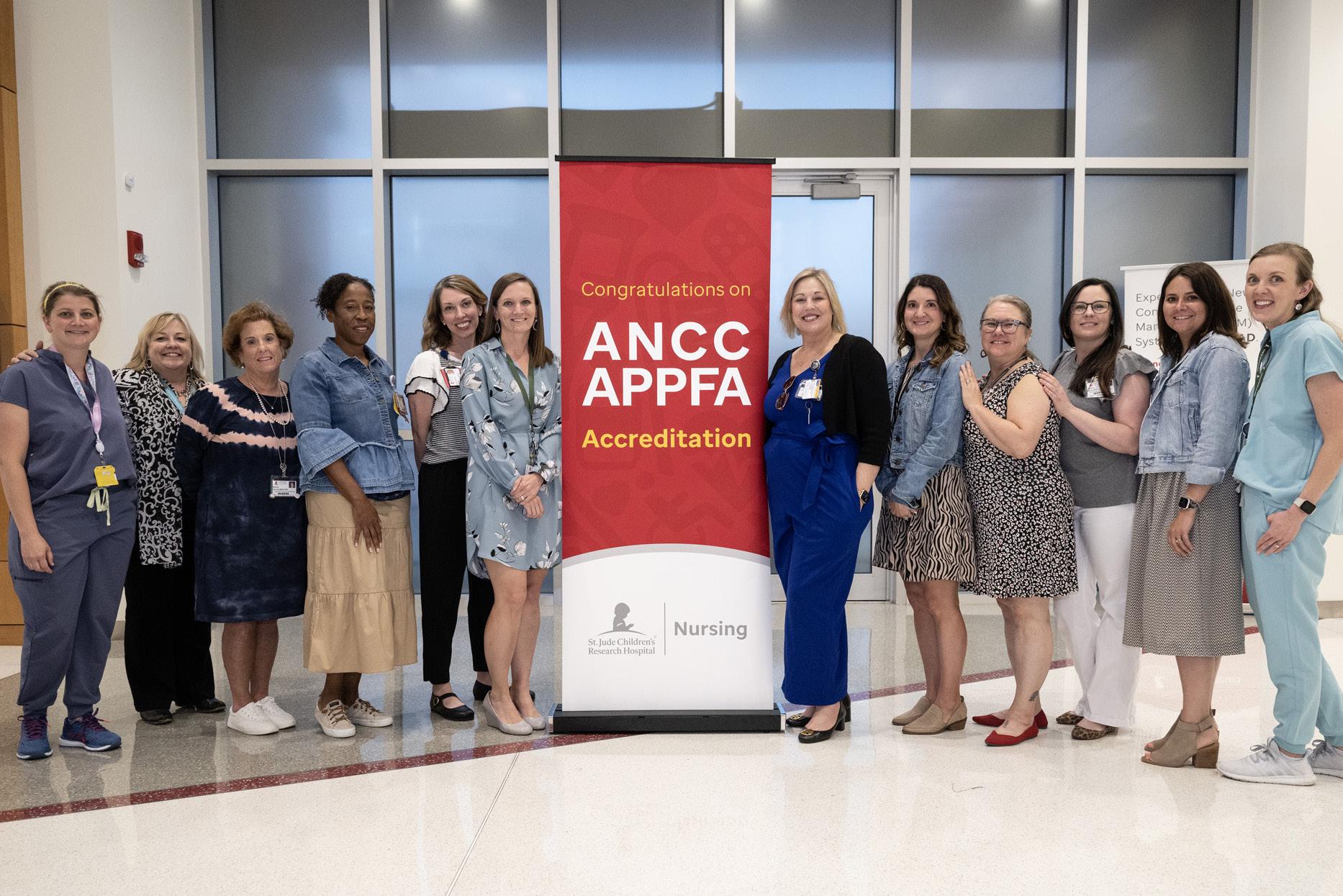
Victoria Mackay, MPA, PA-C, Bone Marrow Transplantation and Cellular Therapy physician assistant, completed the EVOLVE program in 2021 at St. Jude. She said it was beneficial in her transition from student to clinician.
“The program delineated what topics and competencies I should be achieving at certain time points. It also allowed for reflection and feedback. These intentional tools helped shape my practice and grow my knowledge,” Mackay said.
Stone, Ureda, and Pease, and some of the program fellows attended the Annual ANCC Transition to Practice Conference in May 2024 to receive the award with distinction in New Orleans. The program leaders will also give multiple podium presentations on their involvement as leaders of a prominent APPFA program. We look forward to continual improvement in the transition to practice space.
In 2023, the Center for Advanced Practice (CAP) expanded its professional development and education department. Based on a needs assessment and ongoing initiatives, CAP developed three important ongoing education series to increase Advanced Practitioners (APs) knowledge and skills to optimize patient care.
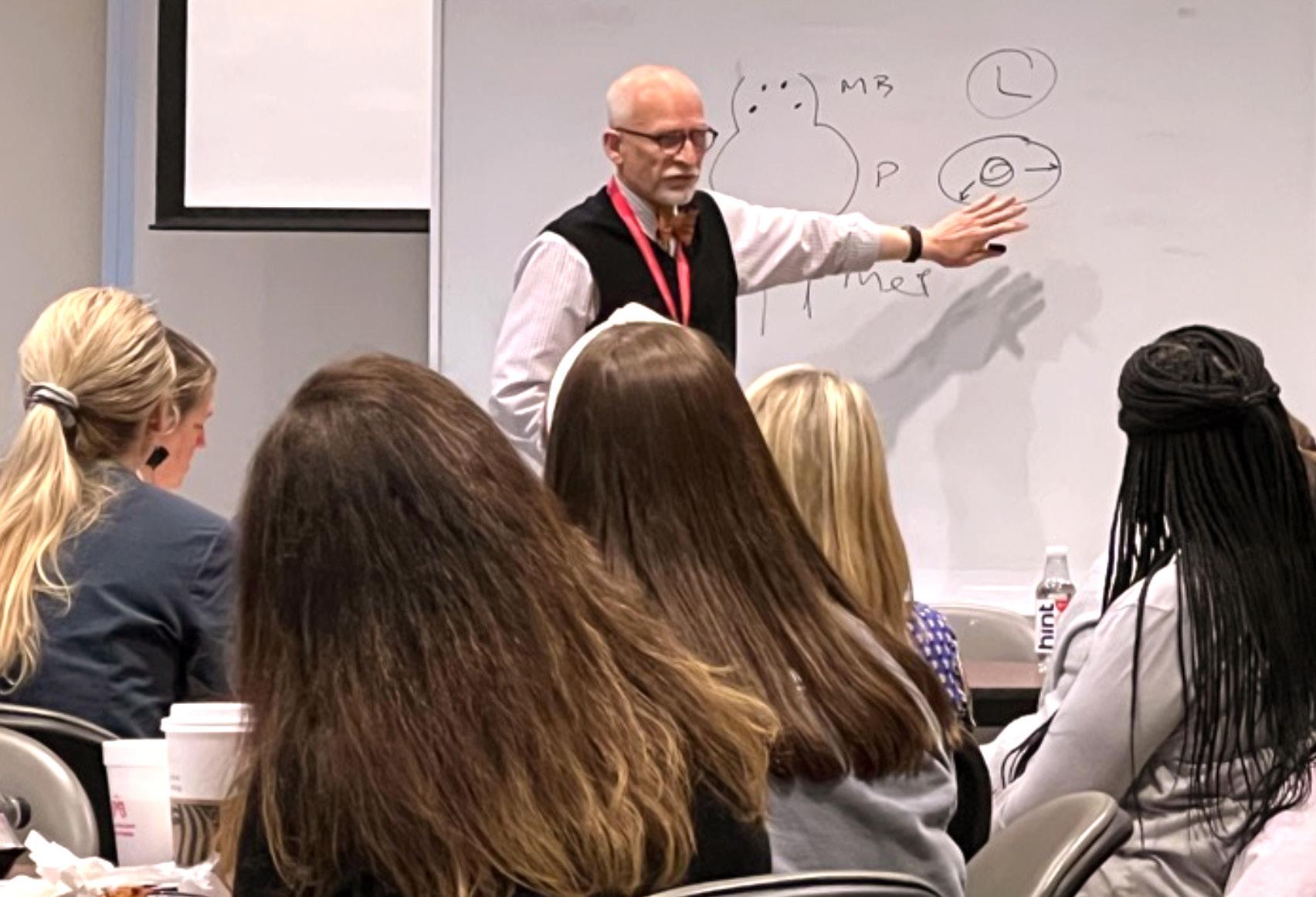
In October 2023, CAP launched its first drop-in-and-learn competency education days. APs could go from station to station and gain knowledge about diverse topics, such as SJAWS scoring/ Sepsis Huddle documentation, Glycemia Management, Respiratory Therapy interventions, and emergency equipment demonstration.
The feedback and attendance were excellent. APs said they enjoyed the relaxed environment, focused learning, variety of experiences, hands-on participation, and knowledgeable presenters. This was the first of the competency days, but not the last. The Shared Governance Advanced Practice Council sponsored another competency day in April 2024.
CAP and Zach Abramson, MD, collaborated to deliver ongoing radiology education in multiple forms. Abramson has joined our Advanced Practice Provider Fellowship faculty to provide introductory education to our APs in their first year at St. Jude.
In addition, all APs are sent radiology education in bite-sized emails with clinical pearls on certain radiographic images. Abramson provides information on types of imaging to order, how to contact radiology, and how to complement understanding interpretations of radiology reports.

CAP found an opportunity to provide advanced training on various acute pediatric topics. The topics were chosen based on conversations with APs, the division of pediatric critical care, and the Office of Quality and Patient Safety. A needs assessment was completed to guide prioritization of topics. A threeyear curriculum was designed and will be executed on a rolling basis.
The first four-hour advanced training was held October 30, 2023. Bicky Khan, MD, led a session on conducting a neurological exam with an opportunity to practice. Following the neurology portion, Pharmacy provided in-depth education on fluid and electrolyte management. An additional session in March 2024 focused on cardiac complications with interactive case studies and septic shock/multiple organ dysfunction syndrome.
St. Jude is co-hosting the 2024 Nursing Management of Sickle Cell Disease (SCD) Boot Camp in September. An April session was also held earlier this year.
To be held jointly at St. Jude and the University of Tennessee Health Science Center (UTHSC) College of Nursing, the multi-day camp is designed to help nurses and students gain theoretical and clinical expertise in the care of patients with sickle cell disease (SCD). The boot camp is made possible by a Global Blood Therapeutics ACCEL grant and is a partnership between St. Jude, UTHSC, and the International Association of Sickle Cell Nurses and Professional Associates (IASCNAPA).

Yvonne Carroll, JD, RN, director of Hematology Patient Services at St. Jude, leads the IASCNAPA’s Curriculum Committee, whose members teach the boot camp. Carroll identified a need for specialized education for nurses caring for patients with SCD. She sought to create this boot camp, which aligns with the fourth goal in the St. Jude FY22-27 Strategic Plan—strengthen the patient support infrastructure for children with sickle cell disease and other chronic hematological diseases.
“Patients with sickle cell disease are equally as complex as cancer patients, yet no standardized, specialized education or certification is available,” Carroll said. “Training is usually offered to physicians, but nurses are the front-line workers who spend the most time with patients.”
SCD can affect every organ of the body with both acute and chronic complications, so early detection and intervention are key to health outcomes for patients with SCD. Patients often suffer from health inequities due to systemic racism and unconscious bias. With training, nurses can optimize their advocacy for these patients and their families.
During the boot camp, nurses, nursing students, and advanced practice providers learn to care for sickle cell patients in an academic setting. Covering topics across the lifespan, the boot camp’s comprehensive curriculum equips participants with specialized knowledge and clinical assessment skills for detecting symptoms and changes in patients with SCD to prevent morbidity and mortality.
The boot camp incorporates a “train the trainer” for the attendees. Nurses who complete the boot camp will teach the material to other nurses within their institution. Previous boot camp participants have returned home and started Sickle Cell Disease Walks, local conferences or trainings, a Facebook page, a hospital newsletter, and have created educational resources.
Carroll and other event organizers are looking to build on the success of the 2023 boot camps, which grew in attendance and sphere of influence. Attendees represented 21 states within the United States, as well as Brazil, Ghana, Jamaica, Sierra Leone, Canada, Trinidad and Tobago, and Nigeria. St. Jude nurses and advanced practice providers participated as learners and leaders.
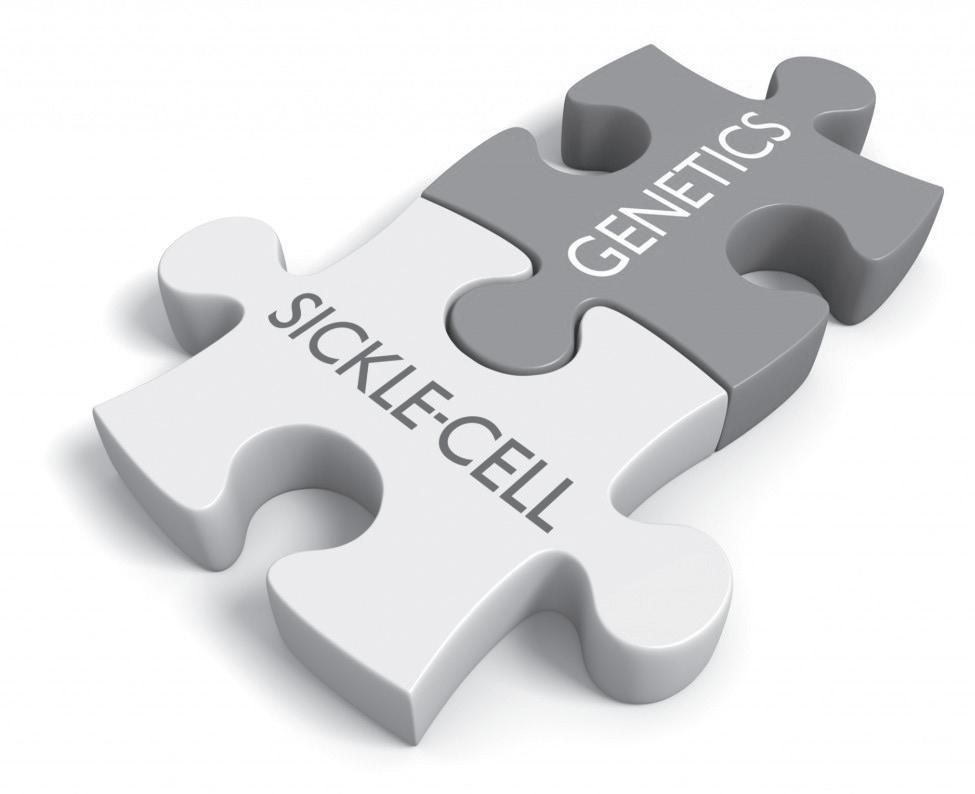


The Vascular Access Triad Plus team was established in 2022 and includes representatives from Vascular Access, Surgery, Interventional Radiology, Clinical Operations and Anesthesia Services. In 2023, the Triad Plus team identified a need for streamlining patient care delivery requests associated with central line insertion consults. The team tackled the challenge to develop a centralized workflow for central line insertion requests, as well as guidance and pathways for after-hours consultations.
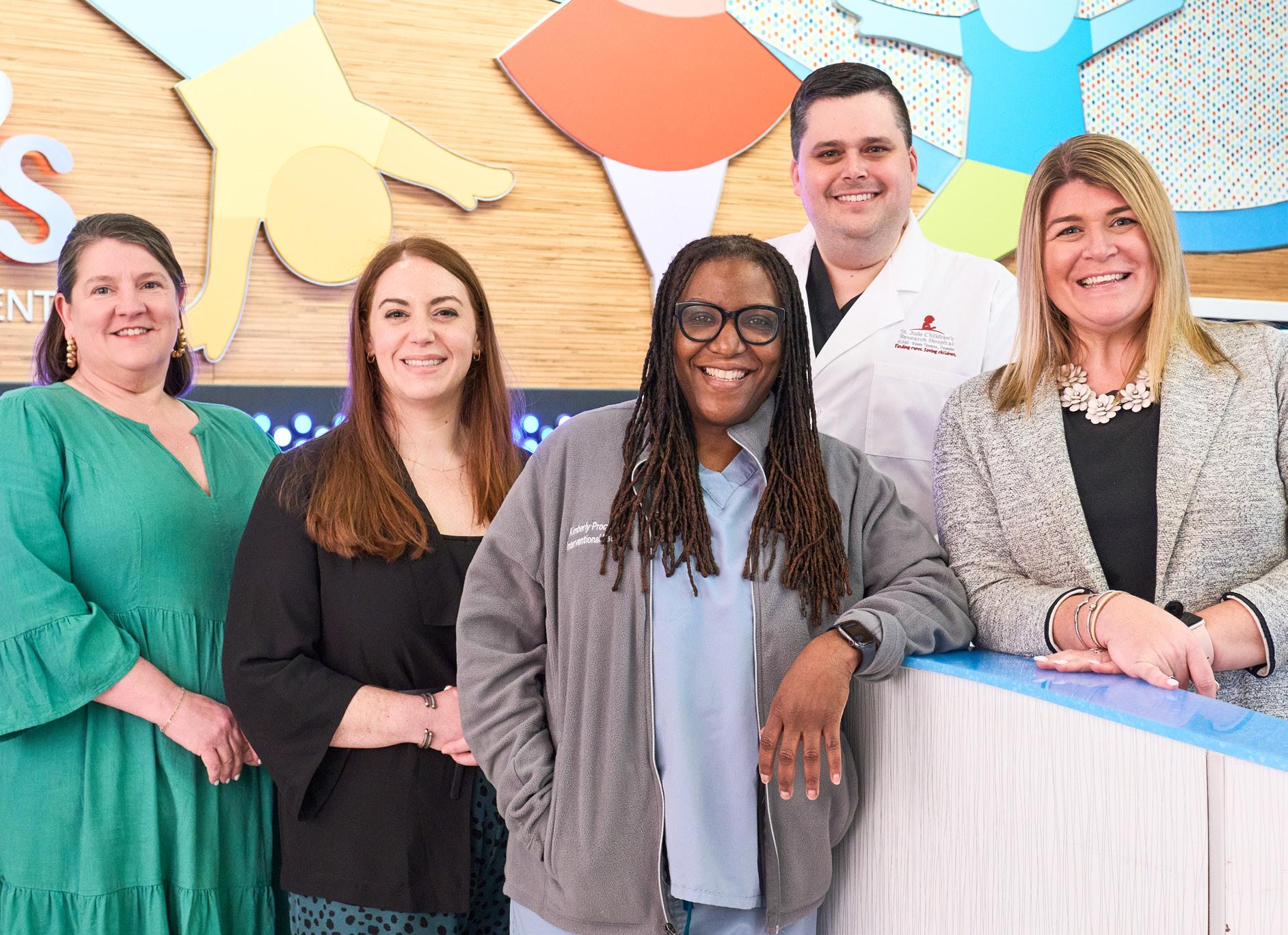
This multidisciplinary team, comprised of Clinical Operations Director Ellie Reece; Clinical Logistics Manager Rebecca Tafaro Boyer, RN; Advanced Practice Providers Kimberly Proctor, PPCNP-BC and Amy Kimble, MS, FNP-C and physician champion Michael Frett, MD, sought to understand barriers to expediting central line insertion requests and collaborated with key stakeholders from Nursing Surgical Services, Nursing Clinical Logistics, Surgery, Interventional Radiology, Anesthesiology and the Clinical Council to implement the process currently known as 595-LINE.
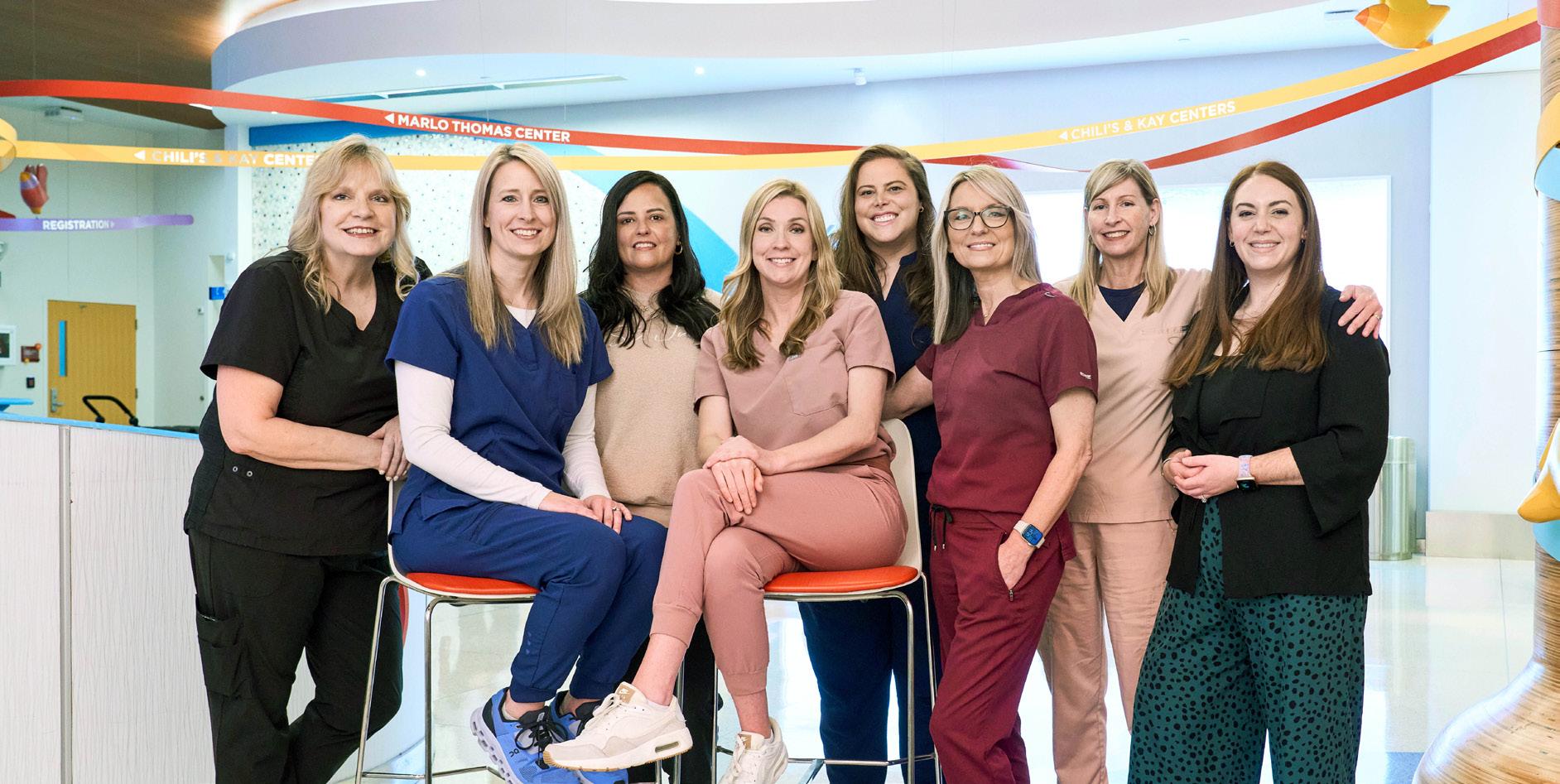
With the development of 595-LINE, a requesting provider across any service line can initiate a central line request through a single phone call, eliminating the need for repetitive communications and redundant consults across the surgery and interventional radiology clinicians. The Vascular Access Team (VAT) answers the phone and uses its expertise to collect all necessary clinical information about the patient, evaluate resources available, and facilitate real-time communication to the appropriate providers to optimize services and streamline care. A VAT member is available weekdays between 8 a.m. and 5 p.m. to answer live calls. An after-hours voicemail is available with guidance on how to request an emergent consult when appropriate, or the provider can leave a message for a patient request that can be triaged the next business day.
In July 2023, the After-Hours Central Line Algorithm was created to clarify the process for requesting an emergent after-hours line insertion.
From go-live on May 1, 2023, to March 1, 2024, 595-LINE has triaged 1,596 phone calls and has initiated over 375 central line insertion requests. Through optimization efforts and provider feedback, progress is being made to expand the hours and services of 595-LINE as well as improve ease of use for ordering clinicians.
The recent success of 595-LINE has been the direct result of a strong collaboration across an array of teams with a shared goal of optimizing patient care. One of the many reasons for the success is the willingness and partnership of the Vascular Access Nurses to take on this additional work and help play the role of quarterback in organizing line access for St. Jude patients.
In June 2023, St. Jude introduced a new initiative, CORE Promise. This initiative aims to enhance patient comfort, reduce pain and alleviate stress associated with needlesticks, thereby improving the overall care experience for patients. The CORE Promise initiative encompasses four key components: Comfort positioning; One primary voice; Reduce pain; and Every child, every time. Central to the CORE Promise initiative’s success is its systematic communication with patients upon arrival at St. Jude. By consistently emphasizing the CORE principles, providers ensure that patients receive personalized, compassionate care tailored to their individual needs.

Needlestick pain is reported as the “worst pain” that pediatric patients experience in the hospital setting but is consistently undertreated. The American Academy of Pediatrics recommends management of pain and stress during medical experiences to increase the comfort of the patient and the overall patient and family experience. St. Jude has a range of pain management resources to use during needlesticks but did not have a policy or consistent process to offer pain management in an equitable manner.
At St. Jude, the Pre-Clinic Assessment area does most of the blood draws and needlesticks in the hospital setting. Julie Morganelli, MSN, RN, CPHON, CNML, coordinated an effort to begin collecting observation data on needlesticks in PreClinic Assessment. The data that she collected for seven months showed that 51% of patients were not offered pain management or the patient declined. As a result, a multidisciplinary quality improvement team formed to standardize what St. Jude patients are offered during needlesticks and to establish our own policy and process.
The CORE Promise Organizational DecisionMaking Team, led by Rachel Schmeizer, MA, CCLS, formed to reduce barriers to offering pain management strategies during needlesticks and to expand hospital-wide efforts. Nursing Education created a learning module and provided information on purpose, documentation, and intervention on CORE Promise to nursing staff. CORE Promise posters were made for every patient room in the hospital. Our patient digital app was updated with information about the rollout of this initiative. A nursing policy was developed, and a large awareness campaign was completed for patients, families and staff.
The CORE Promise team analyzed the data, which demonstrated a great deal of awareness to pain reduction interventions and a positive impact on patient satisfaction and patient comfort during needlesticks. Additionally, the initiative has led to a strong partnership with patients and families who are now more aware of how to advocate for pain reduction interventions.
St. Jude Home Care, LLC, strives to ensure that the same quality of care received in the hospital is extended in the communitybased care that Home Care provides. Through meticulous planning, effective communication, dedicated execution and monitoring for compliance, Courtney Skinner, MSN, RN, clinical manager, Community Division, and her team successfully integrated the CORE Promise framework into the daily operations of Home Care in September 2023. Education sessions ensured all nurses were well-versed in the necessary CORE Promise policy. A structured monitoring system was implemented to assess documentation compliance. Sixty days after reviewing the data for the first quarter and providing one-on-one education and feedback to direct care nurses, the data revealed statistically significant improvement by increasing compliance from 62% to 94%. This demonstrates the Home Care team’s commitment to upholding the highest standards and setting a precedent for excellence.
The CORE Promise initiative showcases the positive outcomes that can be achieved through strategic planning, effective leadership and a steadfast commitment to quality improvement.
In 2020, the Hematology Clinic at St. Jude noted an increase in referrals for adolescent girls with severe iron deficiency anemia (IDA) in the setting of heavy menstrual bleeding (HMB). Review of data indicated the increase in referrals from 2019 to 2020 was over 50%. Additionally, the severity of anemia at initial presentation was concerning, with 65% of patients having a hemoglobin between 2g/dl and 6.9 g/dl and nearly 50% of patients requiring packed red blood cell transfusions. Underlying bleeding disorders are present in 25 to 33% of adolescents with HMB. Therefore, it is important for this population to receive appropriate screening for underlying hematological disorders in addition to supportive treatment.
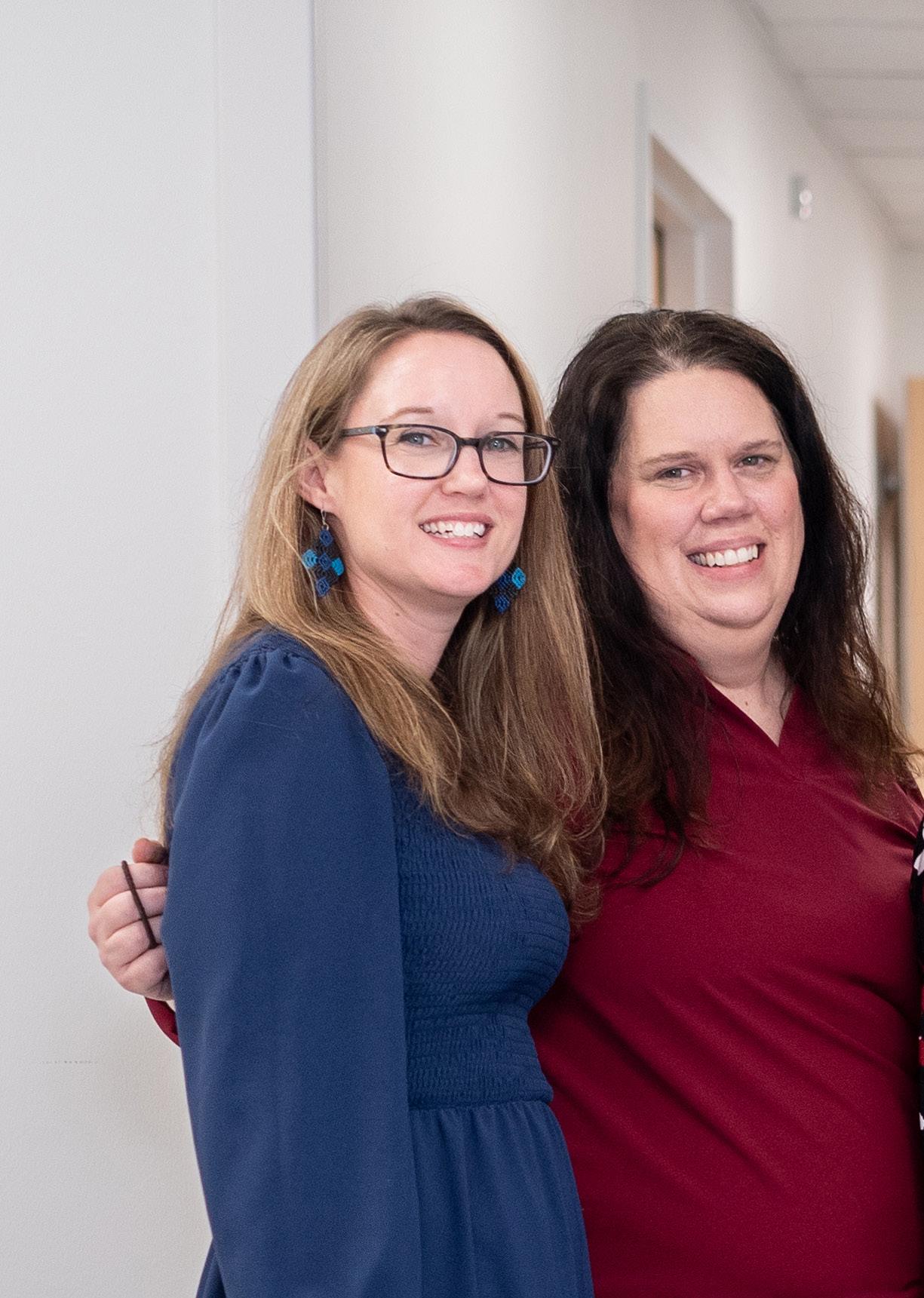
In 2021, the St. Jude Hematology department responded to this need by piloting the Empowering Adolescents with Guidance and Educational Resources (EAGER) Clinic, a multidisciplinary clinical care program aiming to standardize treatment and evaluation of this population.
Katrina Pennington, BSN, RN, care coordinator, Clinical Logistics; Vanessa Howard, MSN, FNP, nurse practitioner, Center for Advanced Practice; and Nidhi Bhatt, MD, physician, Hematology Clinic; and Rohith Jesudas, MD, physician, Hematology Clinic, collaborated to develop an integrated care approach. The team identified barriers for this population, which included a lack of standard approach to treatment and evaluation, lack of access to gynecological care for younger adolescents, deficiencies in health literacy, and a need for clinical guidance for our partnering community physicians. They recruited a multidisciplinary team including Owen Phillips, MD, physician, Gynecology Clinic; Leslie Wells, RN, Hematology Clinic; Misham Henley, MEd, school advocate, School Program, in addition to colleagues in Social Work and Clinical Nutrition. As of 2023, the team has finalized clear acceptance criteria, clinical guidelines for treatment, a tiered approach to evaluation for bleeding disorders to ensure the correct testing takes place at the correct time, and a guidance letter for referring physicians.

During EAGER Clinic visits, patients are seen by a hematologist, gynecologist, Advanced Practice provider, and registered nurse. Patients receive education about HMB, benefits of early recognition and management of IDA, and counseling on dietary iron intake. In addition, each patient is assigned a nurse care coordinator who reviews the plan of care, assesses for barriers and adherence concerns, encourages adolescent engagement, and teaches the patient to use a Pictorial Bleeding Assessment Tool to track his/her cycles. The school advocate assures appropriate accommodations are in place to prevent absence from school. Overall, the multidisciplinary approach to adolescent girls with HMB and IDA with or without bleeding disorders has improved care by providing a consistent approach to treatment, improving interdisciplinary communication, identifying patients with bleeding disorders, addressing barriers to care, and ensuring patients have access to supportive resources. In fall 2023, the EAGER team started building a community engagement plan to address health literacy and access by partnering with school nurses, primary care physicians, and community gynecologists to encourage early detection and address knowledge gaps surrounding HMB and IDA. The team is currently exploring effects of social determinants of health on the outcomes of the patients seen in EAGER Clinic.
The COVID-19 pandemic brought many challenges to the nursing profession in 2020 and 2021. Recruitment and retention became a major struggle and adversely affected turnover rates in hospitals across the country. While certain clinical areas were impacted more than others, nursing annual turnover at St. Jude has remained less than 10% overall. However, there was a sensitivity to how the national nursing shortage may affect St. Jude.
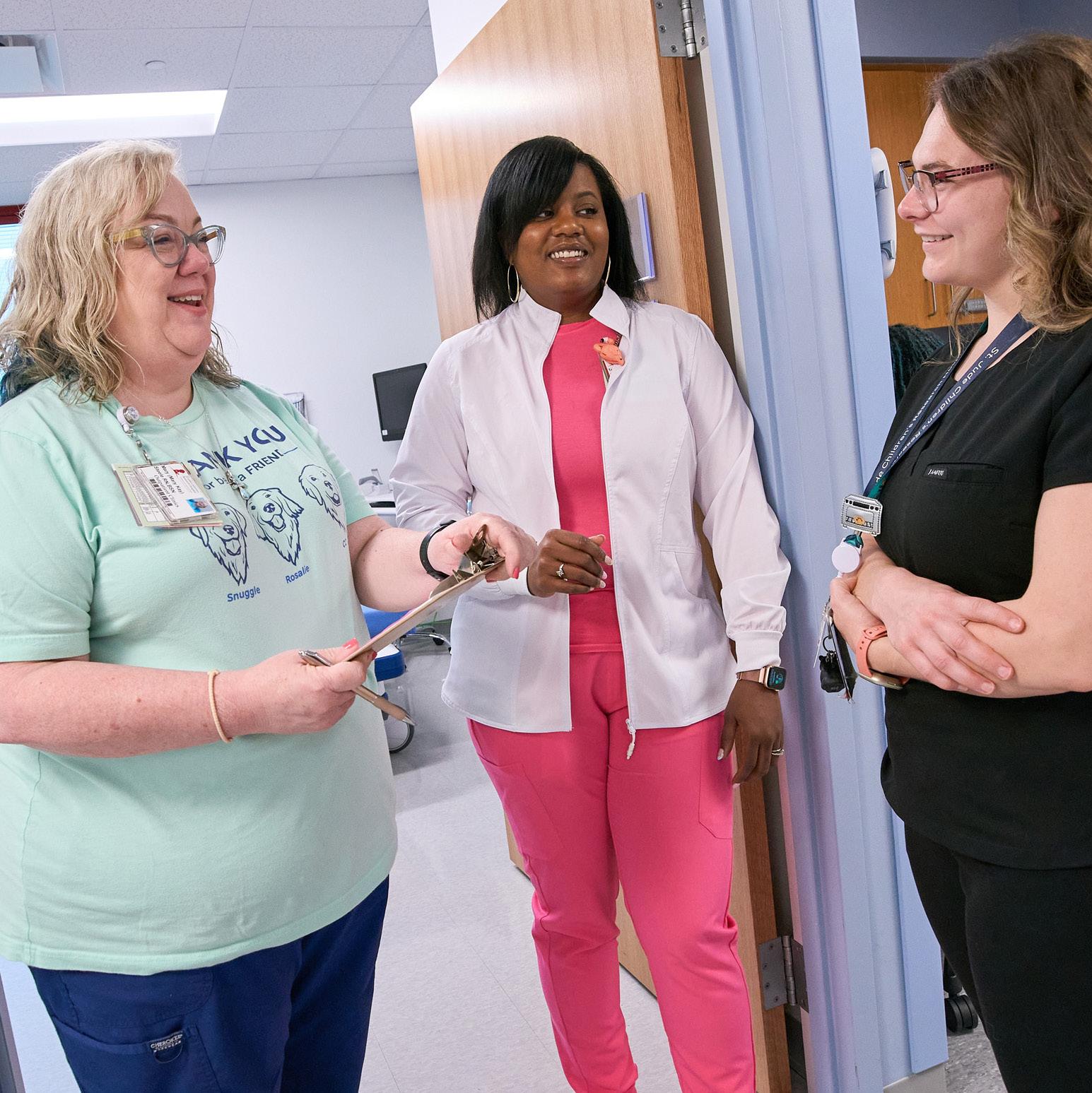
Clinical nurses and leaders attended a strategic planning retreat to continue work on the FY2227 Nursing Strategic Plan. Attendees participated in an analysis exercise to identify strengths, weaknesses, opportunities, and threats (SWOT). An identified threat was the potential for increasing turnover rates due to the current nursing environment and national shortage. Though St. Jude has maintained a low turnover rate compared to the national average, this risk was a concern for retreat participants. The results of the analysis were divided into seven different categories to become the focus of goals in the strategic plan. Recruitment and retention were identified as a focus area. A group of leaders and nurses volunteered to serve on a task force to address this risk. The group decided to create six teams to focus on different aspects of recruitment and retention and to ensure best practices were employed to address any increase in turnover risk.
The six teams focused on the following efforts:
1. Pipeline Partnerships
2. Brand Marketing
3. Social Connections
4. Flexible Staffing
5. Building Trust
Each of the teams developed strategies to address the risk of turnover. The pipeline partnerships group established sustainable partnerships in local and national academic communities to consistently provide high-quality graduate nurses. The brand marketing group developed strategies to promote the St. Jude brand through resources, advancement opportunities, benefits, support, and mission. Social connections developed opportunities for social interactions for the retention of quality nurses from a broad geographic pool. Four flexible staffing options came out of the flexible staffing group including an inpatient indirect nurse shift to assist with peak admission and discharge times, an outpatient role assignment shift to streamline responsibilities, an increase in float pool nurses, and a modified weekender program. The group working on building trust was delayed in anticipation of the new chief nurse executive’s arrival.
The teams presented their findings to the Nursing Leadership Council in 2023. They handed off their recommendations to the teams that would be best suited to initiate the interventions. The Nursing department has been successful at maintaining an annual turnover goal of less than 10%.
Recognizing risk and taking proactive action steps has positioned St. Jude Nursing well in recruitment and retention efforts for the future.
When patient families arrived at The Domino’s Village on October 10, 2023, they entered a pristine six-story building with more than 307,000 square feet of residential and recreational space. It is the largest St. Jude housing facility with 140 units, including 40 short-term-stay and 100 longterm-stay apartments.
Behind the scenes, several St. Jude teams worked tirelessly over the past six years to build and open The Domino’s Village. In 2017, Housing and Patient Services, Patient and Family Experience Office, and Facilities Design and Construction started interviewing architecture firms, meeting with parent focus groups, making decisions on the number of units, and visiting other housing facilities across the country for inspiration.

After finalizing the design and receiving a $100 million funding commitment from Domino’s, the hospital broke ground on The Domino’s Village in 2020. Housing and Patient Services, Patient and Family Experience Office, Environmental Services (EVS), Facilities Operations and Maintenance (FOM), Security, Food Services, and Facilities Planning and Analytics worked together to ensure completion.
Kimberly Michael, Facilities Design and Construction, served as project manager for The Domino’s Village. Facing pandemic-related delays and supply chain constraints, the teams overcame every obstacle to finish the newest St. Jude housing facility.
“These teams have put everything they have into this. We committed to spending donor dollars wisely and providing the best housing for our patient families,” Michael said.
During every step of development, Housing and Patient Services and the Patient and Family Experience Office shared design elements with the Patient Family Advisory Council. Caron Byrd, Housing and Patient Services vice president, said design adjustments were made based on the council’s input.
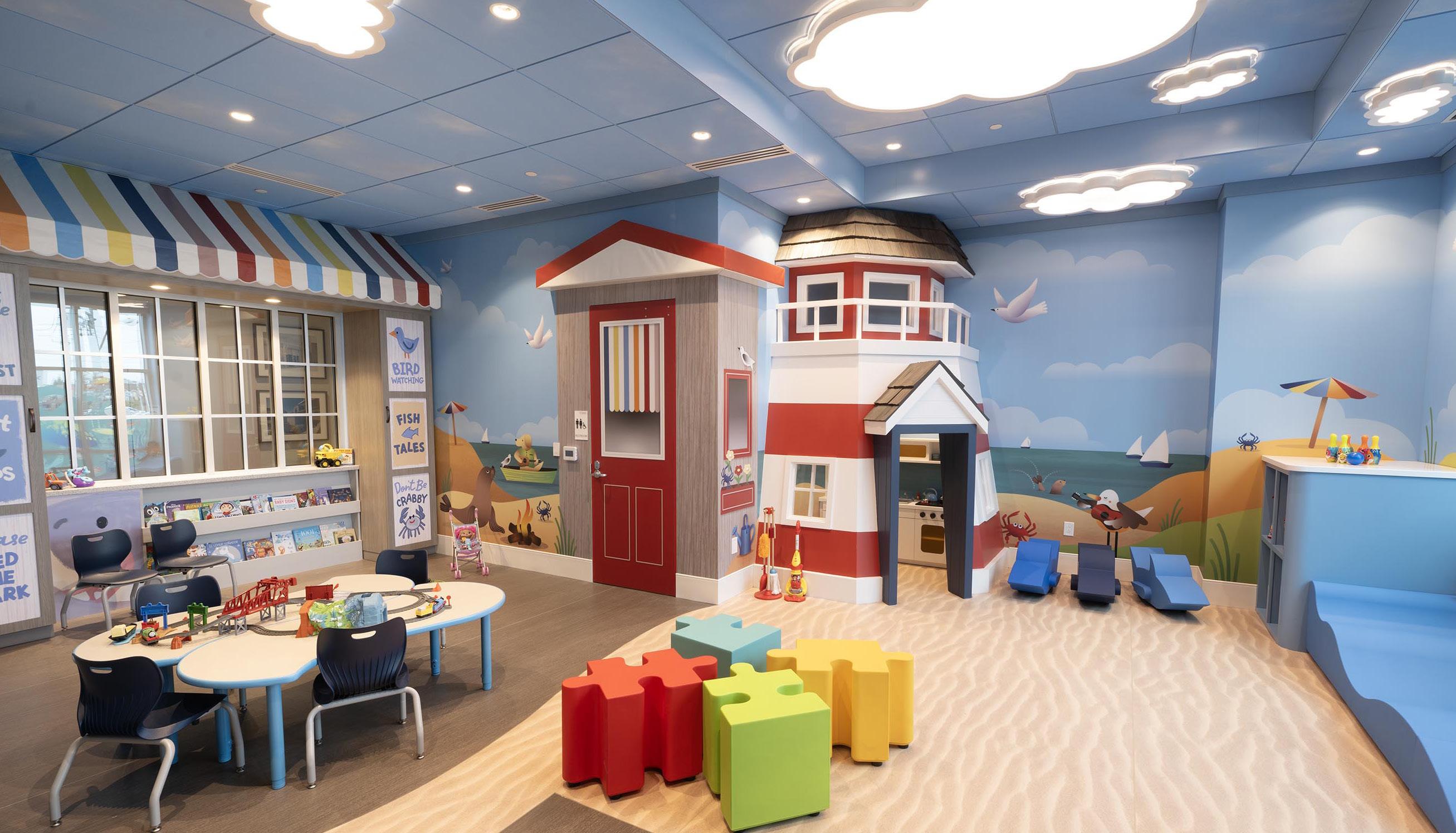
“We survey families frequently about their stay in housing and make improvements. They asked for the ability to control the thermostat in their room. They asked for more overhead lighting, which is needed for changing lines and dressings. We listened,” Byrd said.
In addition, the design teams added a second bathroom, washer, and dryer in long-term-stay apartments, more outlets, better Wi-Fi, and accessible playground equipment. Caregivers also requested handheld shower heads and grab bars on the shower walls, which makes bathing children easier and safer.
The Domino’s Village features several common spaces where families can interact with each other. The second floor houses a toddler room, rec room, arts and crafts room, and large outdoor playground.
“It has places for gathering and conversations. We want caregivers to get to know other caregivers and for children to play with other children,” Byrd said.
The large dining area also provides a gathering space for families. For the first time in St. Jude housing, Food Services is operating the dining facility and providing breakfast, lunch and dinner to families. Culinary Operations Director Michael Vetro said the dining facility operates like a scaleddown Kay Kafe with a grill, salad bar and hot food station.
“The Food Services team is honored to help curate the patient experience at The Domino’s Village. We aim to provide a calm and inviting space with flowing lines and easy-to-navigate stations,” Vetro said.
Another first for Housing, The Domino’s Village includes an outpatient clinic and a Pharmacy kiosk. Once a patient’s medication is loaded into the kiosk, the kiosk sends the patient or caregiver a text message with a code to use for accessing the medication.
From the kiosk area to the apartments, there is a dedicated EVS employee behind every clean space at The Domino’s Village. In addition to cleaning dust and debris during construction, the EVS team worked hard to clean and stage the units for families. EVS washed tableware, bed linens, and towels, and they also set up small appliances like toasters and coffee makers. Kim Redmond, Environmental Services operations manager, said EVS works with Housing to guarantee families have everything they need during their stay.
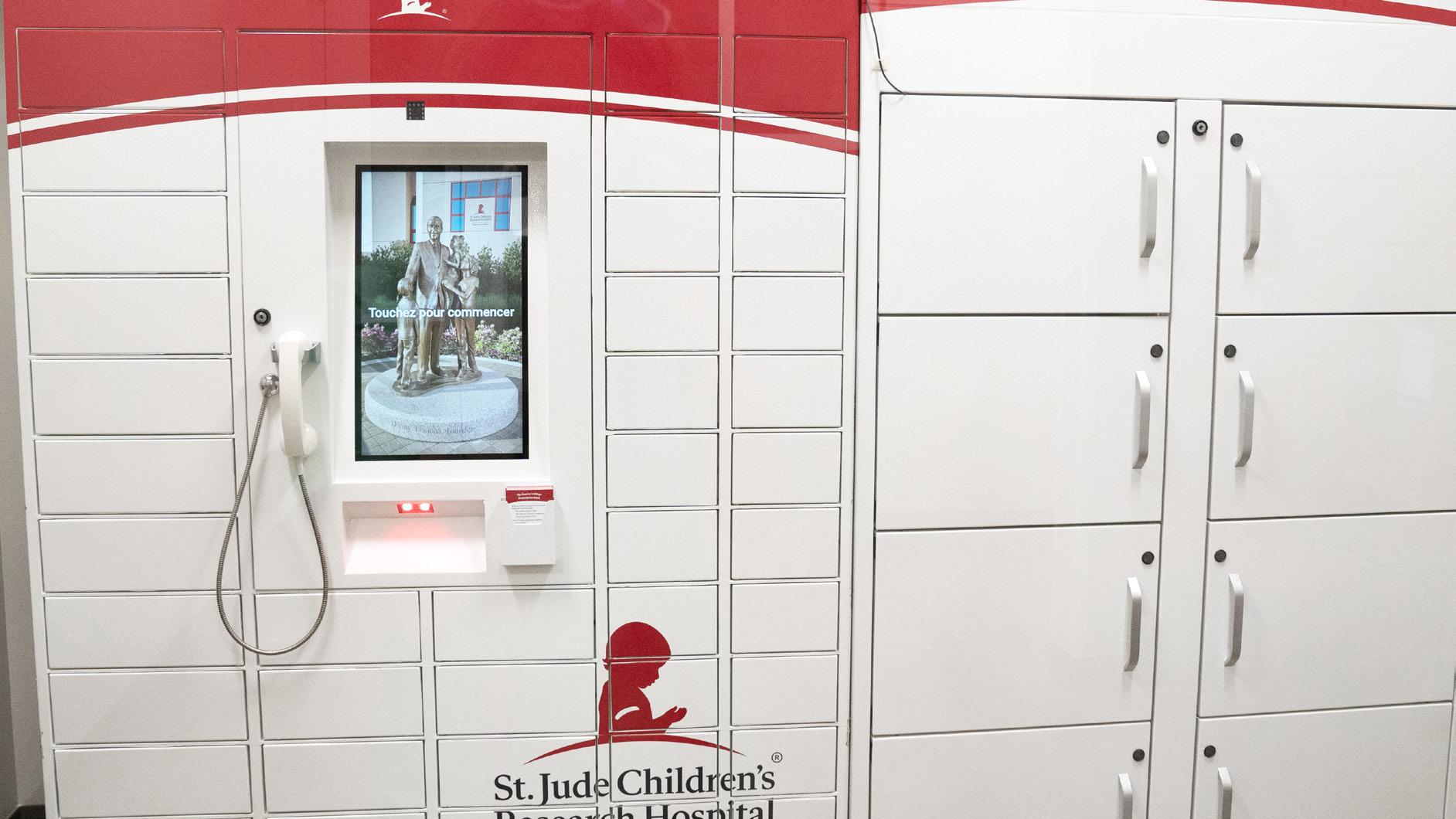
“We set the bar as high as possible. We will continue to take care of the needs of the families, so their apartments are clean and sanitized,” Redmond said.
In the long-term units, there is also a dishwasher, full-size refrigerator, washing machine, and dryer. In addition to providing maintenance on these large appliances, FOM maintains all equipment and systems in The Domino’s Village.

Thomas Cowing, Housing Facility Maintenance manager in FOM, said the staff spent months learning the intricacies of the building. They personally checked every dishwasher and washing machine in the 100 long-term units to make sure they worked.
“We are there to support the families and provide the best customer service. We want to make sure the lighting, temperature, electrical power, and everything else is functioning the way it should,” Cowing said.
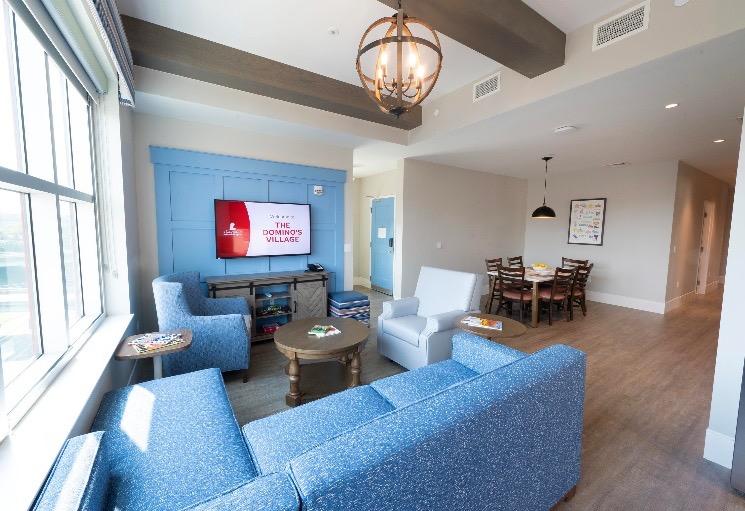
FOM, EVS, Housing and Patient Services, and Food Services have continued to operate, clean, and maintain The Domino’s Village.
“This project is for families, so they can focus on getting their kids healthy and not worry about housing,” Michael said. “We wanted to create a space that feels like home.”
St. Jude patient families deserve the best care, facilities, and amenities.
One of the newest places they can find all three is The Domino’s Village, which has been well received since opening its doors in fall 2023.
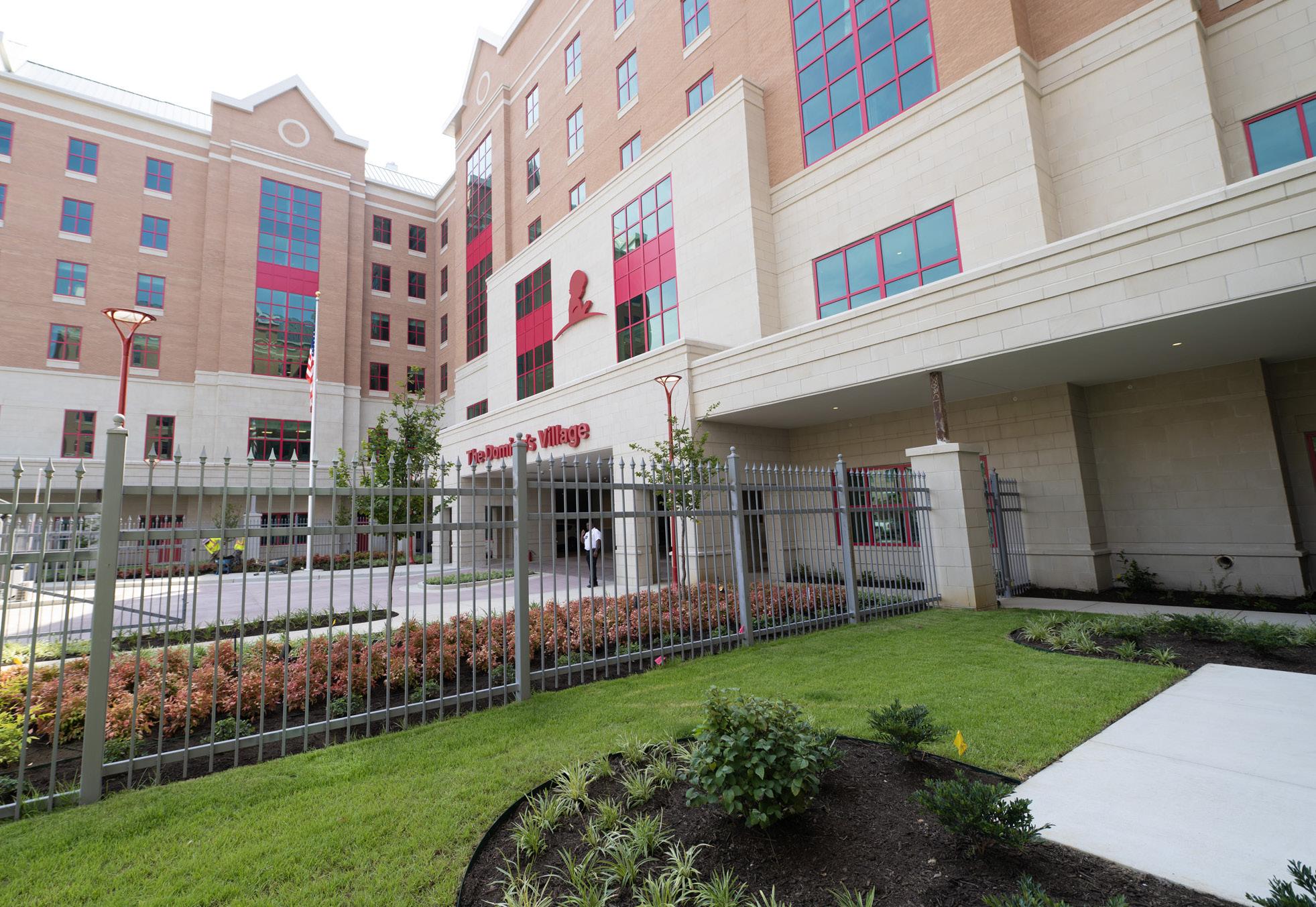
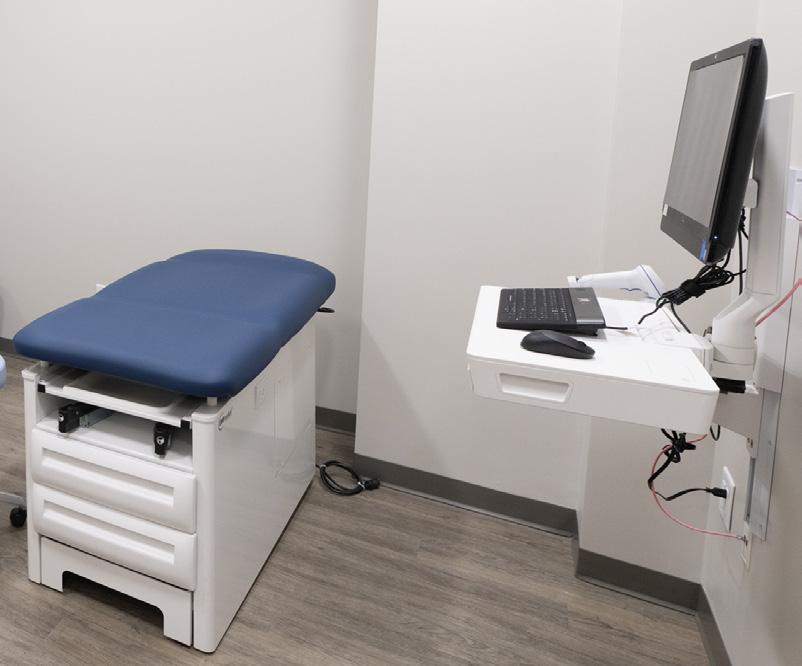
This best-in-class facility has gotten even better with the opening of an outpatient clinic.
Patients staying at The Domino’s Village or Tri Delta Place can visit the clinic on TDV’s first floor by appointment only for pre-clinic assessment, line dressing changes, and pre-procedure clearance. Clinic hours of operation are Sunday, 4 to 7 p.m.; Monday and Tuesday, 6 a.m. to 7 p.m.; and Wednesday and Thursday, 6 a.m. to 4 p.m. The clinic is closed Friday and Saturday.
The Domino’s Village is also home to the first medication dispensing kiosk approved for patients in Tennessee.
Steve Pate, Outpatient Pharmaceutical Services director, said the kiosk is designed to provide convenience and ease of use for patients and caregivers.

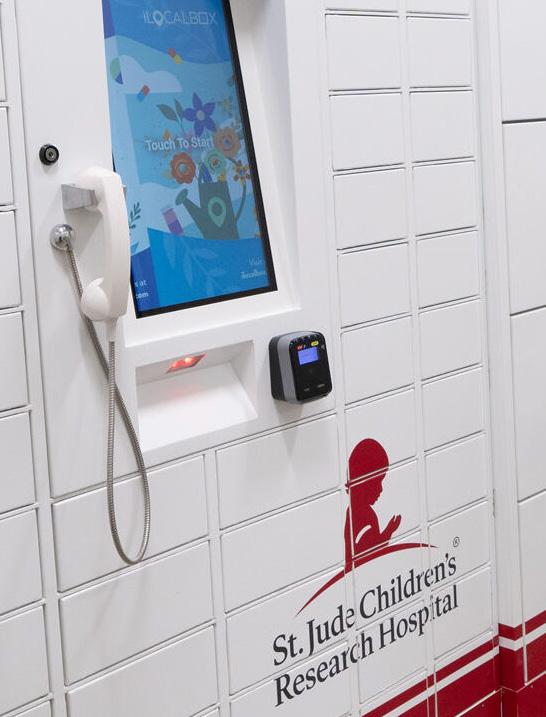
“The kiosk is a great tool for Pharmaceutical Services to extend our care continuum into housing and allow patient families to pick up their child’s medications at more convenient times without having to wait in line at the hospital,” Pate said. “We’ll definitely be seeking their feedback on their experiences with the kiosk to help with future plans.”
Once a patient’s medication is loaded into the kiosk, the kiosk sends the patient or caregiver a text message with a code to use for accessing the medication.
If the patient’s medication requires patient counseling by the pharmacist, the kiosk has a phone and video screen that enables the caregiver to interact with a St. Jude pharmacist on the main campus. Once counseling is complete, the pharmacist releases the medication for the caregiver to access.
St. Jude Home Care, LLC, a home health agency for the hospital’s patients, recently earned its home health accreditation from Community Health Accreditation Partners (CHAP), an independent, nonprofit accrediting body for home and community-based health care organizations. CHAP is the only organization in the U.S. that grants a discrete pediatric certification to home health agencies.

St. Jude Home Care, LLC, is the nation’s first agency to achieve this distinction.
The agency achieved its home health CHAP accreditation with a pediatric certification Friday, November 11, 2023, after two years of operation and a three-day, unannounced on-site survey. To achieve CHAP accreditation, St. Jude Home Care, LLC, underwent a rigorous evaluation process that assessed its compliance with the CHAP standards of excellence, which are based on the best practices in the home health industry. The accreditation demonstrates that St. Jude Home Care, LLC, provides its patients with home health care services that meet the highest standards of quality and safety.
“I love that we have an opportunity for an outside expert to come in and validate the good things we’re doing and point out a couple of small areas where we can do better. We work hard every day to do better,” said Brandon Triplett, MD, Home Care’s medical director.
Teresa Harbour, chief operating officer of CHAP, said this achievement underscores the dedication and leadership of St. Jude in pediatric care and demonstrates the institution’s unwavering commitment to providing exceptional services to children.
“St. Jude’s pioneering efforts set a new standard in the health care industry, exemplifying the best in home-based pediatric care,” Harbour said.
In its evaluation, CHAP found that St. Jude Home Care, LLC, was 100% compliant with pediatric care standards and 99% compliant with the accreditation standards for home health care services.
St. Jude FY24 Priorities goal 9.e explicitly names Home Care, LLC, as a focus area for the institution. Becoming accredited was an integral component of achieving this goal and setting a worldwide standard for patient care in pediatric home health.
“We are honored to become the first CHAP agency to be accredited in home health and certified in pediatrics,” said Shayla Williamson, MSN, RN, NE-BC, president and administrator director for home health. “We are grateful that CHAP embraced the uniqueness of the patient population here at St. Jude and recognized our commitment to excellence.”
St. Jude Home Care, LLC, was established in 2021 as a response to the COVID-19 pandemic, which posed a significant risk for immunocompromised patients who needed frequent visits to the hospital for treatment. The agency provides comprehensive and specialized home health services, including skilled nursing, home health aide, and occupational and physical therapy services to patients who are under the care of highly trained medical teams at St. Jude. St. Jude Home Care, LLC, is proud to be a part of the St. Jude mission of finding cures and saving children. The agency aims to enhance convenience and efficiency as it continues to provide patients and their families with the compassionate, quality care they deserve.
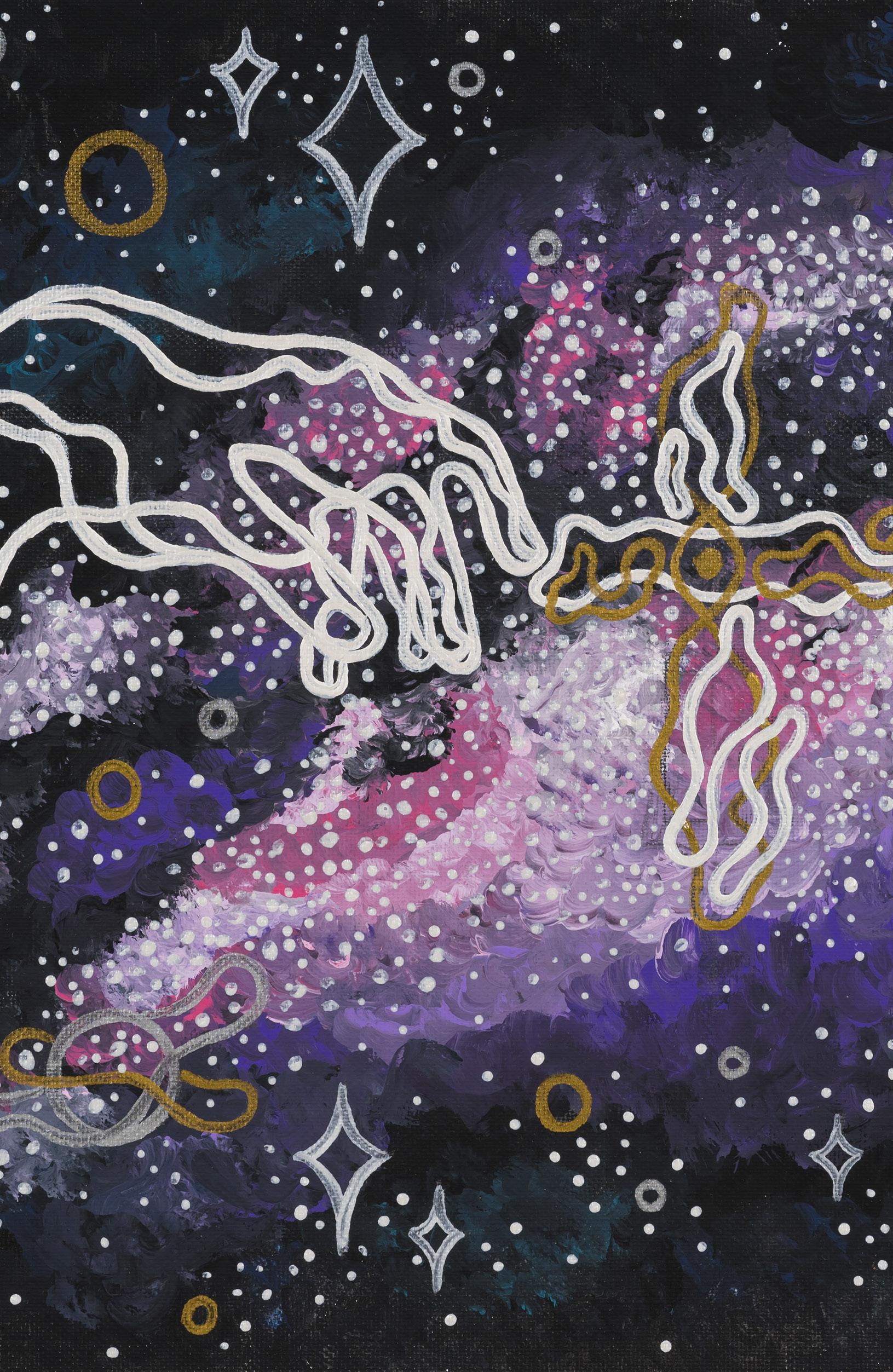

The Epic electronic health record (EHR) launched in October 2022. As end users began learning the new features and functionality, suggestions for enhancement and optimization began to stream in from across the institution. In early 2023, clinical, operational and Information Services leaders established a robust governance structure to provide oversight for decisions impacting Epic stabilization and enhancement. This post-live governance structure maintains the collaborative decision making that was established during the IGNITE project and comprises several workgroups representing various applications and patient care specialties, including ambulatory, inpatient, surgery, pathology, and pharmacy. Nurses are embedded in these workgroups to ensure the voice of nursing is represented.
Additionally, the Nursing Informatics Council serves as an advisory group to ensure broad nursing input is obtained to enhance Epic usability. Council members also serve as liaisons back to the Information Services Governance workgroups as changes and decisions are being contemplated. Visit the Epic Matters! page on the St. Jude Hub for a detailed list of workgroups and membership.

Most, if not all, of our ambulatory nurses and providers can attest to the many challenges that ensued due to Epic’s multiple patient encounters. For the uninitiated, a separate encounter is created for each patient appointment and all corresponding orders are then linked to that encounter. This makes sense in the typical outpatient setting, but St. Jude is not a typical outpatient setting. Our patients can have anywhere from five to upwards of 10 or more outpatient appointments in a single day, resulting in as many individual encounters.
Once released, orders such as lab draws, medications, and transfusions are hard to see or act upon outside of that encounter. This makes it difficult for a nurse in the Infusion Center, for example, to administer chemotherapy when the medication order is released in the clinic visit encounter. Similarly, a nurse in Procedures wouldn’t be able to collect a lab that was released but not collected in Pre-Clinic Assessment. Finding pertinent documentation from one encounter to another is also challenging. After numerous conversations with our Epic partners, St. Jude sent a group of representatives including clinicians, operational leaders, and IS experts to the Epic headquarters in Verona, Wisconsin, to discuss these issues. Close to 75 Epic employees were in attendance to hear our concerns and lend their expertise as we worked toward finding solutions.
This trip proved fruitful, as several system enhancements were later implemented, alleviating much of our previous encounter woes. Cross Encounter Med Administration (CEMA) enabled nurses to administer and document medications at the point-ofcare even if the medication was ordered or released on a different encounter. Additional lab reports were created, giving nurses the ability to see and act on current and previous lab orders across encounters. System enhancements were also installed to support improved workflows for modifications or cancellations of appointments and admissions, enabling effective communications to promote continuity of care. Finally, a multi-pronged approach was implemented for unifying clinical workspaces included standardizing MAR configurations and activity tabs for outpatient nurses, as well as improved
functionality for clinical workstations. Refining our EHR is an ongoing process, and improvements would not be possible without collaboration and support from nurses, providers, analysts, hospital leadership, and our Epic partners working in tandem to ensure optimal patient care. Nurses continue to provide feedback and suggestions as we continue refining and enhancing Epic.
Nurses serve as subject matter experts for Epic dashboard validation
Epic dashboards provide a centralized location to display data gathered from nursing documentation. For example, CLABSI, falls, and pressure injury dashboards display compliance data for performing and documenting bundle elements that are in place to prevent the occurrence of health care-acquired conditions. The compliance data displayed in the dashboards helps nursing staff focus on areas with opportunity for improvement.
Nurses played a crucial role serving as subject matter experts in collaboration with the Epic analytics team to validate those dashboards. Through a series of validation sessions in 2023, nurses worked with the team to review each bundle element in multiple dashboards. Clinical nurses shared their expertise to locate appropriate documentation for each of these elements. Their guidance during these validation sessions also led to some changes to optimize the flow of nursing documentation. The participation of nurses in these sessions was invaluable in assisting the analytics team with ensuring the dashboards were displaying accurate data.
Rima Saad, PhD, RN, CPHON; Jami Gattuso, MSN, RN, CPHON, FAPHON; Morgan Melancon, MSN, RN, CCRN; Sarah Currie, MSN, RNC, NEA-BC; Belinda Mandrell, PhD, RN, FAAN; Monnie Abraham, PhD, RN
Evidence-Based Practice (EBP) has long been a recognized method to translate the best evidence into bedside patient care and improve patient outcomes. The EBP Fellowship at St. Jude began in 1998 as a program to provide knowledge and skills to nurses and other disciplines and to create champions of the EBP process. Jami Gattuso, MSN, RN, CPHON, FAPHON, from the Division of Nursing Research, directs the fellowship with assistance from two former EBP fellows now serving as EBP mentors.
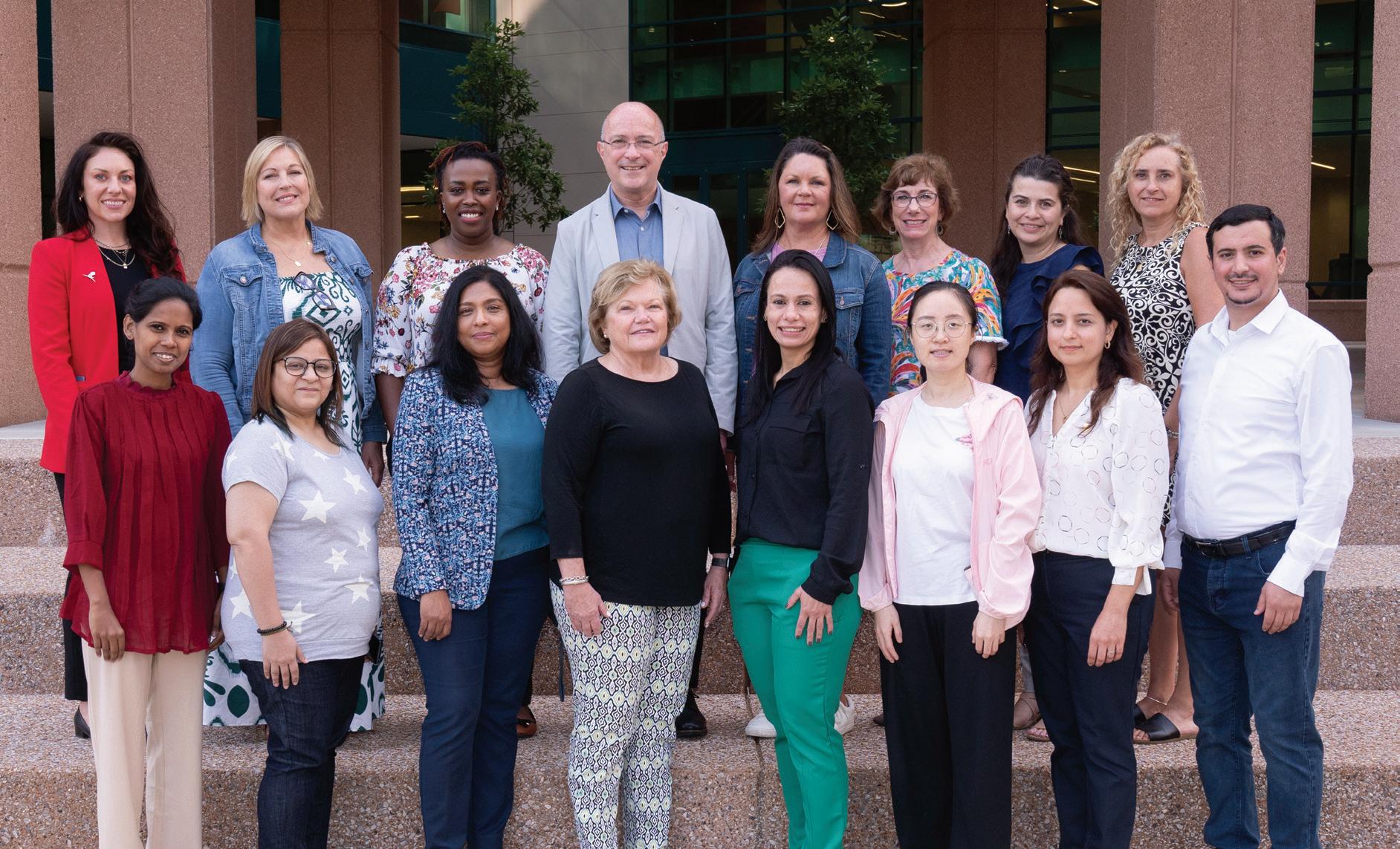
The fellowship is open to clinical nurses with 18 months or more of pediatric hematology oncology experience, with approval from their nursing manager. After a clinical nurse submits his/her application and it is accepted by the Division of Nursing Research, the clinical nurse commits to an 18-month program. Fellows in the program meet twice monthly for eight hours of instruction and four hours of proposal development. The lecture content details the steps in conducting research, quality improvement and EBP, as well as critic of professional literature. During the fellowship, the nurse implements his/her EBP proposal within his/her designated unit.
Global Nursing, St. Jude Nursing, and the Division of Nursing Research collaborated to modify the existing program. They extended the fellowship to nurses from low- and middle-income countries, providing support for creation and implementation of EBP proposals and impacting the global care of children and adolescents with cancer. In April 2023, seven nurses from Uganda, China, India, Pakistan, Poland, Jordan, and Brazil were selected to participate and paired with a St. Jude EBP champion with similar clinical interest.
The EBP fellowship program includes a condensed curriculum of recorded sessions on various EBP topics, and these sessions can be viewed via the Cure4Kids global information sharing platform. Twice monthly Zoom meetings are conducted, with Saad, Gattuso, and nursing fellows, to discuss content and shape project ideas. The St. Jude EBP nurse champion collaborates with the global participant during biweekly virtual meetings. The global nurses also spend one week on the St. Jude campus for learning and dissemination of the EBP proposal.
Five of the seven EBP proposals have been implemented. These include standardization of CPR guidelines, maintenance of skin integrity during bone marrow transplant, patient-reported pain assessment, early ambulation post-surgery in the intensive care unit, and nurse-initiated thrombolytic therapy for occluded central venous access devices.
Two projects are awaiting institutional approval, with both projects implementing distraction practices during invasive procedures.
We have found that a virtual EBP Global Fellowship can be successfully implemented with institutional nursing support and an abbreviated curriculum. Preliminary approval of projects by each global institution will be incorporated into future cohorts.
On May 10, 2023, the Research/Evidence Based Council, the Division of Nursing Research, and Psychosocial Services hosted the annual Nursing Research and Psychosocial Services Symposium in the Marlo Thomas Center at St. Jude. The theme was “Building the Future of Patient Care.”

The symposium was open to all nurses and allied health professionals and provided an opportunity to highlight clinical scholarship and showcase the impact on patient care outcomes. St. Jude is an accredited provider of nursing continuing professional development by the American Nurses Credentialing Center’s Commission on Accreditation. St. Jude is also approved by the American Psychological Association to sponsor continuing education for psychologists. Participants in this symposium were eligible for free continuing education credits for both nursing and psychology.
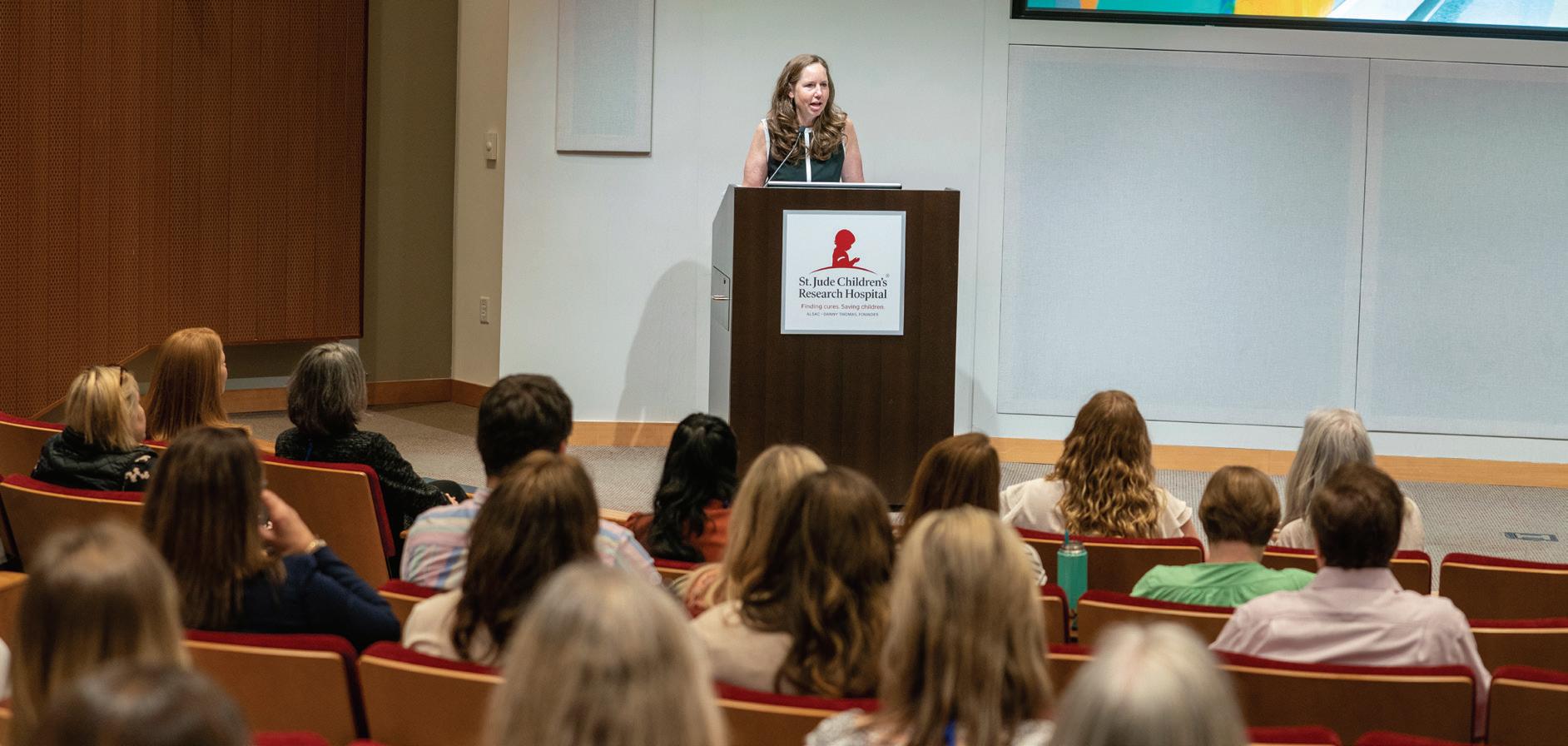
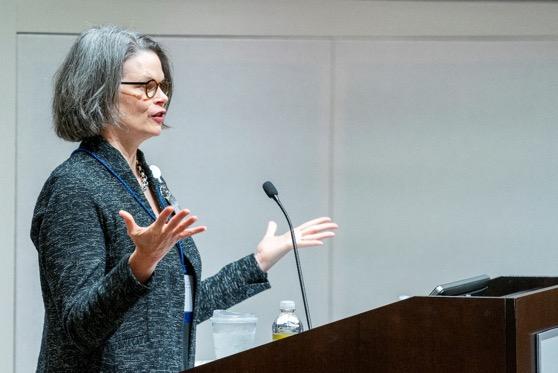
Presentations included:
During the symposium, several events included staff presentations and poster viewings. Above, Diane Roberts, vice president, Strategic Communication, Education and Outreach (SCEO), was the opening keynote speaker. Left, Emily Browne, TOP director, DNP, APN, RN, speaks during the event. There were 14 posters, and the poster judges were trained by the Division of Nursing Research.
• “What is Improvement Science and Why Should I Care?” by Kristy Dallas Alley, MS, and Jonathan Burlison, PhD, CPPS
• “Book a Nook: Finding Respite during the Hospital Day,” by Catie Maley, BSN, RN, CPHON
• “I Didn’t Know What to Say: Addressing Microaggressions within the Healthcare Setting,” by Ayanna A. Johnson, PhD
• “The Impact of Telehealth on Quality of Life and Clinical Practice in Hematology,” by Nina M. Antoniotti, RN, MBA, PhD
• “A Quality Improvement Project to Increase Utilization of Pain-Reducing Agents and Reduce Distress during Needlestick Procedures,” by Rachel Schmelzer, MA, CCLS, and Julie Morganelli, MSN, RN, CPHON, CNML
After the symposium adjourned, all participants were invited to network and enjoy a reception with posting viewing on the rooftop of the Inspiration4 Advanced Research Center.
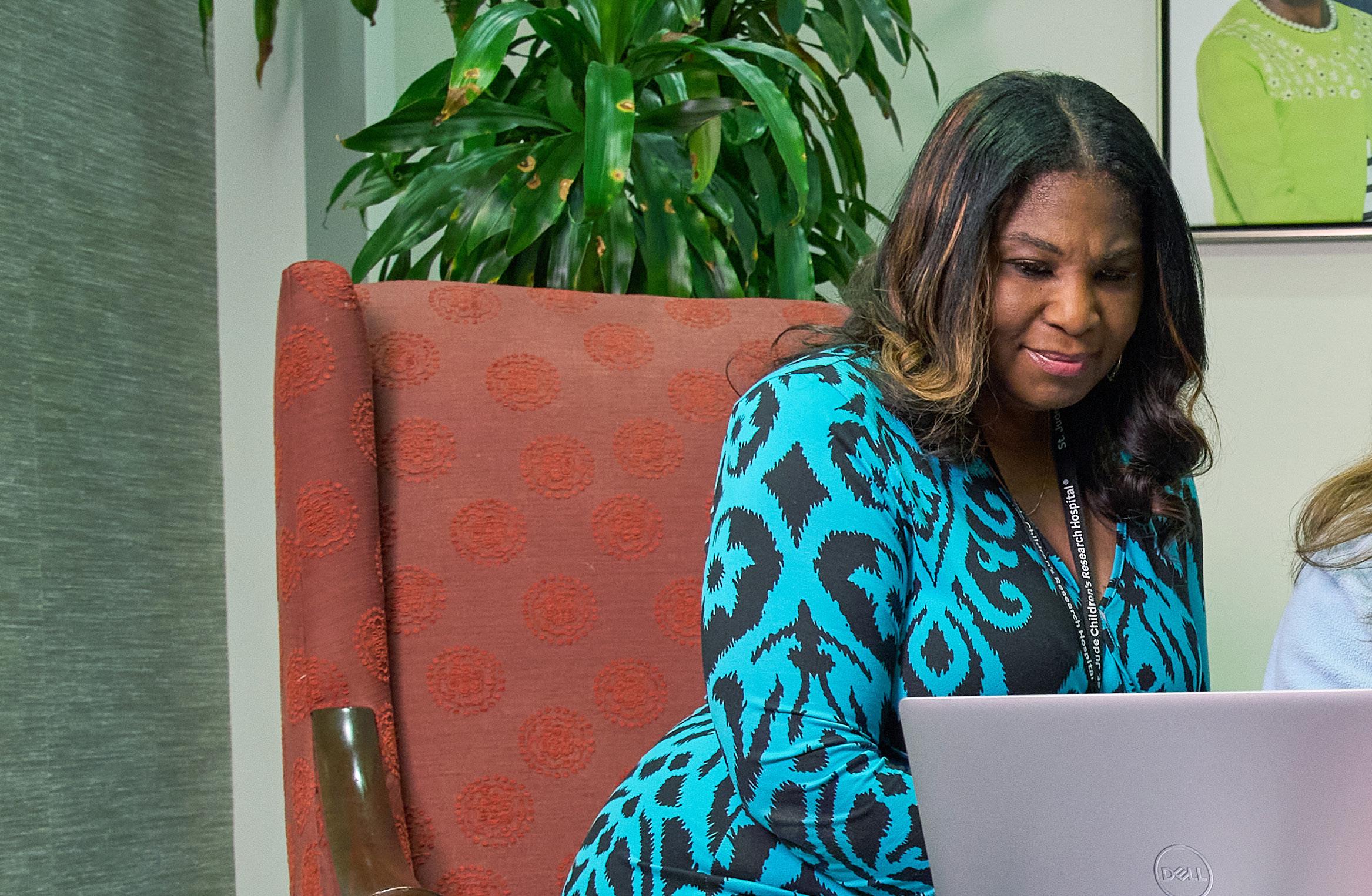
Empirical measurement of quality outcomes is imperative as a Magnet-designated organization. St. Jude Nursing has established quality metrics to monitor patient care, clinical processes, and nursing workforce outcomes. Nurse-sensitive indicators such as falls, pressure injuries, central line associated bloodstream infection (CLABSI), patient satisfaction, nurse turnover, education, and certification are tracked and reported for internal verification of control and for benchmark with external quality bodies like the National Database of Nursing Quality Indicators and Magnet. Though quality data is reviewed at organizational, nursing leadership, and Shared Governance councils, the data was not readily visible at the unit level to help nurses continuously identify opportunities to improve patient outcomes and effect change with the processes that impact their work. Additionally, benchmarked data was reported quarterly, limiting the opportunity to act on the data in real-time and make changes needed to improve performance trends.
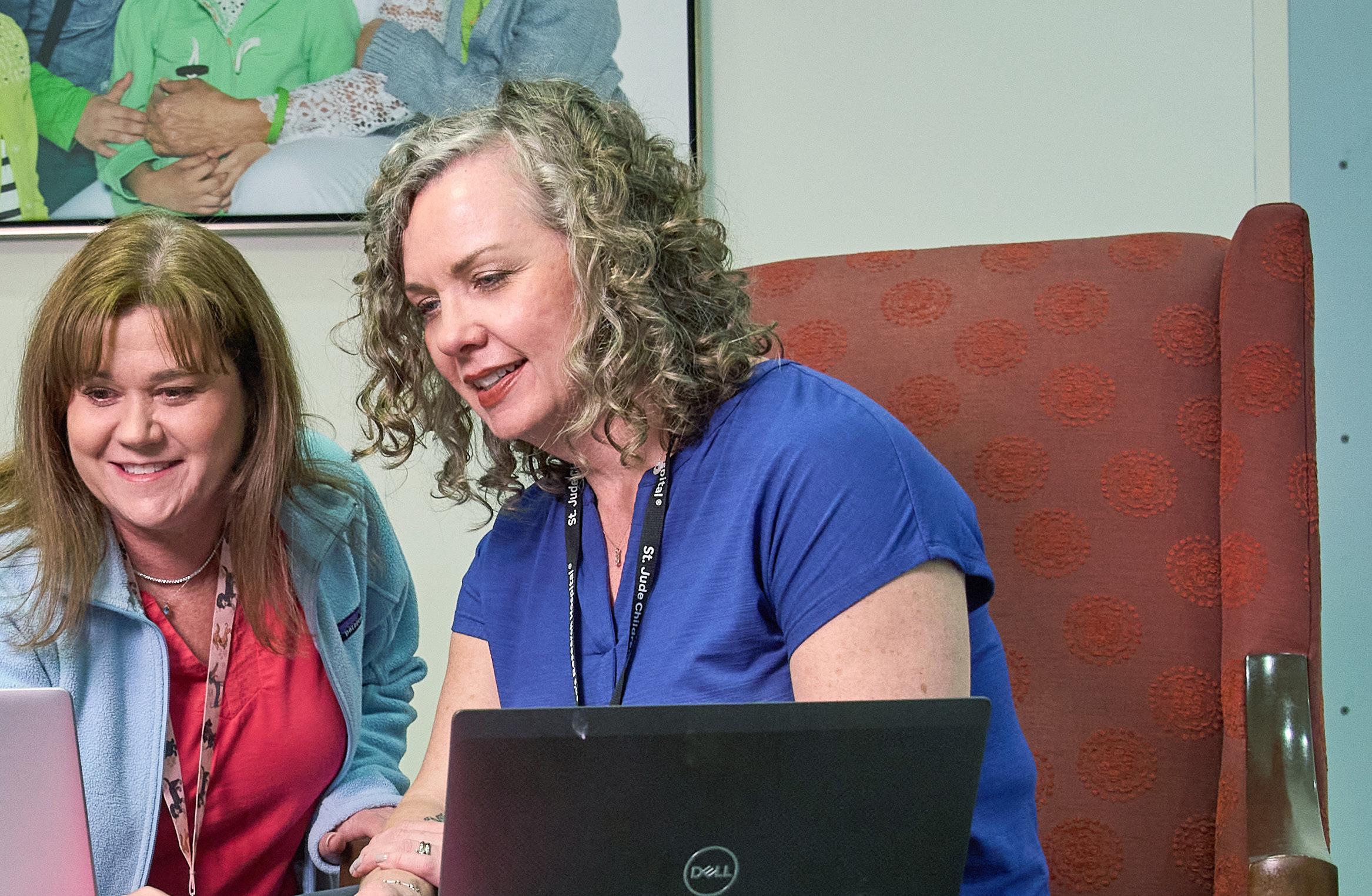
Knowing how vital it is for nurses to have access to trended data to evaluate the impact of their care, Nursing Clinical Excellence Team members brainstormed ways to organize and share data in a meaningful way. Margie Kjellin, MSN, RN, CPHON, NE-BC, director of Nursing Clinical Excellence, discussed nursing data access barriers with program managers Felecia Warner, Rachel Dhority, and Marnie Dorsey. This team accepted the challenge to develop an electronic platform to display data in a way that would help nursing leaders and bedside nurses evaluate departmentand unit-specific quality data. By maximizing the Microsoft applications offered in the intranet hub, Warner, Dhority, and Dorsey partnered to develop an intranet Hub page
that allows any nurse at any time to view his/her service line and unit-specific data. This new Nursing Quality page was published on the Nursing Hub in January 2023. In fall 2023, further enhancements were made, and the Nursing Quality Hub 2.0 page was launched.
Access to monthly trended data has not only been instrumental in driving unit-level improvements, but it has also given nurses ownership and autonomy to proactively develop data- driven action plans and make informed practice decisions on their units. Visible and accessible data supports nurse clinical decision making and quality improvement efforts.
Belinda Mandrell, PhD, RN; Donna Hancock, MSN, RN; Sarah Williams, MSN, APN; Anna Baker, MSN, APN; Melody Burchett, BSN, RN; Steven Pearson, BSN, RN; Lauren Shade, BSN, RN; Saad Ghafoor, MD; and Valerie Crabtree, PhD


S
p r o t e c t i v e m e c h a n i s m d u r i n g i l l n e s s . W i t h
o
L i g h t s , M u s i c a n d T V o n d u r i n g t
Background: Sleep promotes healing and helps prevent adverse health outcomes in pediatric intensive care units (PICUs). Sleep duration and quality is vital to critically ill children. The average sleep time for children in the PICU is well below the recommended total sleep time across all stages of development. Patients in the PICU are awakened an average of nine times per night and typically interrupted from sleep every 50 minutes, while a complete sleep cycle is approximately 90 minutes. Environmental variables such as invasive procedures (lab draws, X-rays), nursing care, room temperature, noise and light levels are among the factors that can prompt frequent awakening. Unfortunately, PICUs are notoriously difficult places for patients to obtain restorative sleep.
Sleep and Environmental Assessment: A multidisciplinary team formed March 2022 to assess the physical environment of our PICU and collect baseline data. Goals included establishing baseline measurements of the patient’s sleep duration via actigraphy, collecting parent-reported measures of the child’s sleep quality during the PICU stay, and surveying staff and parents of children previously hospitalized in the PICU regarding their perceived barriers to quality sleep. Lastly, the team measured sleep-related environmental variables including light and sound levels in the patient’s room.
Results: Twenty-seven non-ventilated patients ages 2-20 (mean age = 12.37 + 5.58) in the PICU had at least two nights of data collected. Rooms were equipped with sound meters (Noise Dose Meter PCE-SLD 10; n =20) and light meters (Reed Instruments Light Meter; n =26), and 15 patients ages 8-20 years wore actigraphy (mean age = 14.47 + 3.31).
At baseline, mean total sleep time per actigraphy was 314.27 (+ 116.49) minutes, mean sleep efficiency was 72.78% (+ 14.0), and average wake after sleep onset (WASO) was 116.23 (+ 59.12) minutes, all well below recommended sleep standards. Sound levels remained consistent throughout days and nights with 99.93% of days and nights recording conversation-level sound (35 - 85 dB) and no time with quiet (<35 dB) intervals. Patient rooms were dark (<30 lux) throughout the days (81.82%) and nights (95.61%). The remainder of the days were spent under dim light (39-199 lux; 14.86%) with minimal time spent in typical daytime light (200+ lux; 3.32%). Surveyed staff and parents endorsed redesign of the PICU environment with the establishment of quiet hours, bundling of care, baths during the day, trash and linen removal during the day, lights off/on and reduction of noise.
Conclusion: Baseline data revealed little variation in sound across 24-hour periods, with conversation-level sound almost all the time. Light remained dim throughout the day and night, with only 3% of days spent in typical daytime lighting. Limited variation in light and sound across the days and nights could contribute to disrupted sleep in these patients. Total sleep time and WASO could be improved with increased light and noise during the day and reduced sound at night.
Clinical Implications: The interdisciplinary team has implemented an intervention to increase daytime light and reduce sound at night with bundling of care to improve the patient’s sleep quality and quantity in the PICU as measured by actigraphy and parentreport sleep measures, and measurement of noise and light within the patient room.
Interventions:
To improve the PICU environment:
• Full support of PICU medical/nursing staff and interdisciplinary cooperation
• Establishment of age-appropriate sleepwake cycles
• Minimization of interruptions during nighttime/sleep hours
• Medical/nursing education
• Family education regarding importance of sleep and sleep/wake cycles
• Objective sleep (actigraphy) and environmental monitoring (noise, light)
To improve the patient and work environment:
• Establishment of quiet hours with lights on and off
• Stealth nursing at night with bundling of care to minimize time in room
• Rescheduling of routine lab draws and radiographs
• Doors to manual setting during nighttime hours
• Baths during dayshift with goal to have completed by 11:00pm
• Removal of trash and linen during the day
• Reduction of noise at nursing station
As the improvement project continues, we hope to improve patients’ sleep quality by 20% from baseline as measured by actigraphy and parent report with reduction in noise and lights consistent with time of day.


Publications
Carruthers, K., & Folk, S. (2023) Outcomes of patients who underwent treatment for anti-HLA donor specific antibodies before receiving a haploidentical hematopoietic cell transplant. Pediatric Blood and Cancer, September; 69(12) 1-5. https://doi.org/10.1002/pbc.29993
Clemons, B., Carroll, Y., Wills, C., Henry, A., Day, S. W. (November 2023). Sickle Cell Boot Camp to Promote Nursing Excellence. Southern Nursing Research Society (SNRS), Charlotte, NC, United States.
Crom, D.B., Walters, L.A., LI, Y., Liang, J., Hijano, D.R., Mulrooney, D.A., Carmichael, L.A., Ford, S.L., Andrews, S.J., Smith, D., Hudson, M.M., Mandrell, B.N. (n.d.). Seroprevalence of measles (rubeola) antibodies in childhood cancer survivors. Journal of Pediatric Hematology Oncology Nurses.
Ellis, K., Harrison, A., Nichols, A., Antoniotti, N., Horn, S., et al. (2023). Breaking down barriers: Implementation of telehealth in pediatric patients with a bleeding disorder [Abstract]. CCS Book of abstracts. Haemophilia, 29:14. https://doi.org/10.1111/hae.14781
Gillipelli S, Kaye E, Garza M, Ferrara G, Rodriguez M, Soberanis Vasquez DJ, Mendez Aceituno A, Antillón F, Gattuso J, Mandrell BN, Baker J, Rodriguez-Galindo C, Agulnik A*, Graetz D*. Pediatric early warning systems (PEWS) improve provider-family communication from the provider perspective in pediatric cancer patients experiencing clinical deterioration. Cancer Med, 2023 Feb; 12(3): 3634-3643. doi:10.1002/cam45210. PMID: 36128882
Hijano, D. R., Ferrolino, J. A., Swift, E. G., Michaels, C. A., Max, A., et al. (2023). SARS-COV-2 infection in high-risk children following tixagevimab–cilgavimab (Evusheld) pre-exposure prophylaxis: A single-center observational study. Frontiers in Oncology, 13. https://doi.org/10.3389/ fonc.2023.1229655
Kapalko, A., Datner, W., Sabbatini, G. (2023). Fieldnotes from the PA Preceptorship Program: An interview with the first matched preceptor and mentee. HIV Specialist, Summer 2023. 30-32.
Kamara D, Crowley SJ, McLaughlin V, Hancock D, Li Y, Darji H, Semko J, Wise MS, Merchant TE, Mandrell BN. Circadian rhythms in pediatric craniopharyngioma. Frontiers in Sleep – Pediatric and Adolescent Sleep, 2023 April Vol 2; https://doi.org/10.3389/frsle.2023.1153144
Levine DR, Epperly R, Collins G, Talleur A, Mandrell BN, Pritchard M, Mothi SS, Li C, Lu Z, Baker JN. Integration of palliative care in hematopoietic cell transplant: Pediatric patient and parent needs and attitudes. Journal of Pain and Symptom Management 2023 Sep 66(3):248-257. doi:10.1016/j.jpainsymman.2023.06.005. PMID 3730253
Malone S, Rivera J, Puerto-Torres M, Prewitt K, Sakaan F, Counts L, Zebin ZA, Arias AV, Bhattacharyya P, Gunasekera S, Johnson S, Kambugu J, Kaye EC, Mandrell BN, Mack JW, McArthur J, Mendez A, Morrissey L, Sharara-Chami R, Snaman J, Sniderman E, Luke DA, Graetz DE, Agulnik A, A new measure for multi-professional medical team communication: design and methodology for multilingual measurement development. Frontiers in Pediatrics, 2023 Jun; 11:1127633. doi:10.3389/fped.2023.1127633. PMID 37334217
Mandrell BN, Blake AK, Sharp KMH, Gattuso JS, McGee RB, Harrison L, Ouma A, Caples M, Johnson L-M, Nichols KE. Parental understanding of their child’s germline genomic testing: Intent of disclosure to their child and family. Journal of Personalized Medicine 2023;13, https://doi.org/10.3390/ Merchant, T. E., Hoehn, M. E., Khan, R. B., Sabin, N. D., Klimo, P., Boop, F. A., Wu, S., Li, Y., Burghen, E. A., et al. (2023). Proton therapy and limited surgery for paediatric and adolescent patients with craniopharyngioma (RT2CR): a single-arm, phase 2 study. Lancet Oncology, May; 24(5): 523-534.https://doi. org/10.1016/S1470-2045(23)00146-8
Nasr AS, McCarthy AM, Manworren RCB, Source LR, Ersig AL, Hinderer KA, Calamaro C, Gettis MA, Hanrahan K, Hayakawa J, Heitschmidt M, Middour-Oxler B, Staveski SL, Mandrell BN, LaFond CM, Hernandez TL. Variability in qualifications for principal investigator status in research studies by nurses: A call for clarification. Journal of Pediatric Nursing, 2023 Jan-Feb; 68:18-23. doi: 10.1016/j. pedn.2022.08.009
Persaud Y, Mandrell BN, Sharma A, Carroll Y, Irvin M, Olufadi Y, Kang Guolian, Hijano D, Rai P, Hankins JS, Johnson L-M. Attitudes toward COVID-19 vaccine among pediatric patients with Sickle Cell Disease and their caregivers. Pediatric Blood and Cancer, 2023 May; 70(5):e30274. doi: 10.1002/pbc.30274.PMID: 36860093
Sharma A, Young A, Carroll Y, Darji H, Li Y, Mandrell BN, Nelson MN, Owens CL, Irvin M, Caples M, Jerkins LP, Unguru Y, Hankins JS, Johnson L-M. Genetic therapies for Sickle Cell Disease: Attitudes and informational needs to patients and caregivers. Pediatric Blood and Cancer, 2023 June; 70(6)e:30319. doi: 10.1002/pbc.30319. PMID: 36975201
Sharp KMH, Blake A, Flynn J, Brown S, Rashad J, Harrison L, McGee R, Mandrell BN, Nichols KE. Adolescent and young adult understanding of their childhood cancer predisposition diagnosis: A Qualitative study. The Journal of Pediatrics, 2023 Jun; 261:113538. doi:10.1016/j. jpeds.2023.113538. PMID: 37279817
Tucker P, Loew M, Russell K, Brooklee LT, Mandrell BN, Witcraft SM, Schwartz LE, Crabtree VM. Sleep health behaviors in pediatric patients with newly diagnosed cancer. Journal of Psychosomatic Research, 2023 Sep 172:111413. doi:10.1016/j.jpsychores.2023.111413. PMID: 37354749
Presentations
Armenise, V. Pediatric Symptom Management at End of Life. 5th Annual Pediatric Advanced Practice Provider Conference, Le Bonheur Children’s Hospital, Memphis, TN, November 2023.
Baker, A. Introduction to Critical Care. Advanced Practice Didactic Series. St. Jude Children’s Research Hospital, Memphis, TN, June 2023.
Browne, E. (2023, Dec. 7). Literary Search [Speaker]. Advanced Practice Didactic Series. St. Jude Children’s Research Hospital, Memphis, TN, December 2023.
Brown, K. Introduction to Anesthesia. Advanced Practice
Didactic Series. St. Jude Children’s Research Hospital, Memphis, TN, March 2023.
Brown, K. M. What is a CRNA? St. Jude Children’s Research Hospital, Memphis, TN, March 2023.
Clark, K. Introduction to Endocrine. Advanced Practice Didactic Series. St. Jude Children’s Research Hospital, Memphis, TN, September 2023.
Feraco AM*, Mandrell BN*, Friedmann A, Marks L, Li Y, Weinstein H, Link M, Flerlage JE. Quality of life in pediatric high-risk Hodgkin Lymphoma during and after Brentuximab-based intensive chemotherapy –Comparison to historical treatment cohort and health peers. International Conference on Malignant Lymphoma, Lugano, Switzerland. June 2023.
Guy, J., Sabbatini, G. Introduction to ID-HIV. APP Quarterly Didactic Series at St. Jude Children’s Research Hospital. Memphis, TN, September 2023.
Gray, N. Current approaches in pediatric neutropenia. Tennessee Academy of Physician Assistants Spring Fling 2023, Memphis, TN, April 2023.
Harper, E. Introduction to Hospitalist Medicine and Acute Care Clinic. Advanced Practice Didactic Series, St Jude Children’s Research Hospital, Memphis, TN, June 2023.
Hines-Dowell, S., & McGee, R. B. Clinical Genomics: Pearls for Consenting. Advanced Practice Didactic Series. St. Jude Children’s Research Hospital, Memphis, TN, February 2023.
Howard Sharp KM, Harrison L, Ouma A, Mandrell BN, Johnson L, Tercyak K, & Nichols KE. Parents’ SequencingRelated Distress following Disclosure of Pediatric Oncology Germline Sequencing Results.Symposium to be presented at the 17th International Meeting on Psychosocial Aspects of Hereditary Cancer (IMPAHC), Rockville, MD, May 2023.
Humphrey, Y. Introduction to Psychiatry. Advanced Practice Didactic Series. St. Jude Children’s Research Hospital, Memphis, TN, June 2023.
Jones, S.C. College Prep: Essential Elements of Health Care Transition for Adolescent and Young Adult Childhood Cancer Survivors Pursuing Postsecondary Education. [Concurrent session]. APHON’s 47th Annual Conference and Exhibit, Cleveland, September 2023.
Jones, S.C. Introduction to the Transition Oncology Program. [Concurrent session]. Quarterly Didactic APP Education Series, St. Jude Children’s Research Hospital, Memphis, TN, March 2023.
Kimble, A. Introduction to Surgery. Advanced Practice Didactic Series. St. Jude Children’s Research Hospital, Memphis, TN, December 2023.
Kimble, A. Introduction to Fertility. Advanced Practice Didactic Series. St. Jude Children’s Research Hospital, Memphis, TN, June 2023.
Lamar, Evans, G., Sabbatini, G., Dunlap, T., Williams, B., McAfee, A. The Team Approach to Retention in PrEP and HIV Care. American Academy of HIV Medicine, Memphis, TN, December 2023.
LaVoie, P. Introduction to Hematology. Advanced Practice Didactic Series, St. Jude Children’s Research Hospital, Memphis, TN, September 2023.
Mandrell, BN. Utilization of Photobiomodulation for the Prevention and Treatment of Oral Mucositis. 7th Annual Innovations in Pediatric Oncology. Children’s Hospital of Atlanta. Atlanta, GA, March 2023.
Mandrell, BN. Maximizing Asparaginase Utility in Pediatric and AYA ALL/LBL: Practical Tools forOncology Nurses. Association of Hematology Oncology Nurses Annual Conference. Cleveland, Ohio. September 21, 2023.
Mandrell BN, Hancock D, Caples M, Wise M, Merchant TE, Crabtree V. Prevalence of disorders of hypersomnia and obstructive sleep apena among children and adolescents with Craniopharyngioma. 7th Craniopharyngioma Course. Prince Maxima Center, Netherlands, March 2023.
Mandrell BN, Hancock D, Caples M, Wise M, Merchant TE, Crabtree VMc. Prevalence of Disorders of hypersomnia and obstructive sleep apnea among children and adolescents with craniopharyngioma. Association of Pediatric Hematology Oncology Nurses. Cleveland Ohio. September 2023.
McMillan, C. Introduction to Leukemia and Lymphoma. St. Jude Nursing Academy, Memphis, TN, April 2023.
McMillan, C. Introduction to Leukemia and Lymphoma. St. Jude Nursing Academy, Memphis, TN, October 2023.
McMillan, C. Relapsed Leukemia. St. Jude Affiliate Conference, Memphis, TN, April 2023.
McMillan, C., & Tucker, J. Introduction to Leukemia and Lymphoma. Advanced Practice Quarterly Didactic Series, Memphis, TN, December 2023.
McTyre, A. Introduction to Solid Tumor. Advanced Practice Didactic Series, St. Jude Children’s Research Hospital, Memphis, TN, December 2023.
Michaels, C. Introduction to Infectious Disease. Advanced Practice Didactic Series, St. Jude Children’s Research Hospital, Memphis, TN, June 2023.
Pease, P. & Dodson, M. APP Emergency Management and Sepsis Simulation. Advanced Practice Didactic Series, St Jude Children’s Research Hospital, Memphis, TN, December 2023.
Pease, P. Peer Support I. Advanced Practice Didactic Series, St. Jude Children’s Research Hospital, Memphis, TN, September 2023.
Pease, P. Peer Support II. Advanced Practice Didactic Series, St. Jude Children’s Research Hospital, Memphis, TN, September 2023.
Pease, P., Ureda, T., and Neal, C. Professionalism: Topics and Tasks. Advanced Practice Didactic Series, St Jude Children’s Research Hospital, Memphis, TN, March 2023.
Pickup, L., Schriner, E., Tatum, M., Sabbatini, G. Practicing PA Panel. The University of Tennessee Health Science Center Physician Assistant Program, Memphis, TN, November 2023.
Proctor, K. Introduction to Interventional Radiology. Advanced Practice Didactic Series. St Jude Children’s Research Hospital, Memphis, TN, March 2023.
Humphrey, Y. Introduction to Psychiatry. Advanced Practice Didactic Series. St. Jude Children’s Research Hospital, Memphis, TN, June 2023.
Sabbatini, G. HIV and PrEP in Pediatric and AYA Medicine: A Rapid Review. Spring Fling, Tennessee Academy of Physician Assistants, Memphis, TN, April 2023.
Sabbatini, G. & Guy, J. Introduction to ID-HIV. Advanced Practice Didactic Series, St. Jude Children’s Research Hospital, Memphis, TN, September 2023.
Saleh, A., Flint, R., Nguyen, G. Midnight Munchies: Chemotherapy Review. St. Jude Children’s Research Hospital, Memphis, TN, January 2023.
Saleh, A., Flint, R., Nguyen, G. Midnight Munchies: Chemotherapy Review. St. Jude Children’s Research Hospital, Memphis, TN, February 2023.
Saleh, A., Flint, R., Nguyen, G. Midnight Munchies: Chemotherapy Review. St. Jude Children’s Research Hospital, Memphis, TN, March 2023.
Schmelzer R, Morganelli J. A Quality Improvement Project to Increase Utilization of Pain-Reducing Agents and Reduce Distress during Needlestick Procedures. Nursing Research and Psychosocial Services Symposium, May10, 2023
Simmons, A. Introduction to Neurology. Advanced Practice Didactic Series. St. Jude Children’s Research Hospital, Memphis, TN, September 2023.
Sisam, J. Introduction to Bone Marrow Transplant. Advanced Practice Didactic Series, St Jude Children’s Research Hospital, Memphis, TN, March 2023.
Snyder, A. and Levine, D. Introduction to Quality of Life. Advanced Practice Didactic Series. St. Jude Children’s Research Hospital, Memphis, TN, March 2023.
Stone, S. Advanced Practice Providers and Practice. Pediatric Oncology Summit of Chinese Children’s Cancer Group, Shanghai, China, June 2023.
Stone, Professional issues facing pediatric nurse practitioners. University of Tennessee School of Nursing, Memphis, TN, 2023.
Stone, S., Dean, S., & Greer, J. Desert Island- Operational engagement and communication for a successful go live and beyond. Epic UGM Annual Conference, Verona, WI, 2023.
Stone, S. Impactful Communication. Advanced Practice Didactic Series. St. Jude Children’s Research Hospital, Memphis, TN, June 2023.
Stone, S. Clinical Efficiency and Productivity. Advanced Practice Didactic Series, St. Jude Children’s Research Hospital, Memphis, TN, December 2023.
Stone, S. APP Productivity. Advanced Practice Didactic Series, St. Jude Children’s Research Hospital, Memphis, September 2023.
Tucker, J. & McMillan, C. Introduction to Leukemia. Advanced Practice Didactic Series. St. Jude Children’s Research Hospital, Memphis, TN, December 2023.
Turner, R.A. The Characteristics of a Successful Preceptor. APP Preceptor Course Series. St. Jude Children’s Research Hospital, Memphis, TN, 2023.
Turner, R.A. AWAKE-Achieving Care With less Anesthesia Keeps Everyone Safe. Patient and Family Advisory Council, Center of Advanced Practice, St. Jude Children’s Research Hospital, Memphis, TN, 2023.
Ureda, T. Introduction to Professional Advocacy and Networking. Advanced Practice Didactic Series, St Jude Children’s Research Hospital, Memphis, TN, June 2023.
Walters, L. Introduction to Survivorship. Advanced Practice Didactic Series, St. Jude Children’s Research Hospital, Memphis, TN, March 2023.
Wills, C. W. Sickle Cell Disease: Acute Clinical Manifestations of Sickle Cell Disease. St. Jude Nursing Academy, Memphis, TN, February and August 2023.
Wills, C. W. Sickle Cell Disease: Acute Chest Syndrome. Sickle Cell Boot Camp to Promote Nursing Excellence. University of Tennessee Health Science Center, Memphis, TN, April and October 2023.
Webster RT, Kunin-Batson A, Ness KK, Jones AM, Browne EK, Willard VW, Crabtree VM, Barnwell E, Jones S, Potter BS, Mandrell BN, Feibelman S. Emotional Health as a Barrier Toward Health Behavior Engagement at the Transition-off Treatment. In ME McGrady (Chair), New Directions in Adherence and Self-Management Science. Breakout session (symposium) presented at the 5th Global Adolescent and Young Adult Cancer Congress. Long Beach, CA, USA, June 2023.
Webster RT, Kunin-Batson A, Ness KK, Rooney E, Willard VW, Crabtree VM, Mandrell BN, Potter BS, Barnwell E, Jones S, Browne EK, Feibelman S, Jones AM. Caregiver Emotional Health and Adolescent Health Behaviors at the Transition Off Treatment. International Psychosocial Oncology Society Conference. Milan, Italy, August 2023.
Woody K.D. Difficult Cases. Sickle Cell Complications after Hematopoietic Progenitor Cell Transplantation. Ready Set Grow Series, St. Jude Children’s Research Hospital, Memphis TN, June 2023.
Woody, K. D. Clinical Learning Environment. Advanced Practice Provider Preceptor Course. St. Jude Children’s Research Hospital, Memphis, TN, 2023.
Posters
AfifyZ, Taj M, Srivatsa K, Miller TP, Edington H, Dalal M, Robles J, Ford J, Ehrhardt MJ, Ureda T, & et al. (2023, October 11) Successful inauguration of the pediatric PTLD collaborative (PPC) provides an excellent platform for PTLD registry and prospective studies. International Society of Paediatric Oncology Annual Conference. Ottawa, Canada.
Boggs JE, Caples M, Gattuso J, Levine D, Madni A, Shoulders L, Azzi Y, Ashcraft E, Li Y, Sawyer KE, Johnson LM, Mandrell BN. I’m trying to do the right thing! A mixed methods investigation of moral and ethical distress among pediatric hematology/oncology nurses. Nursing Research and Psychosocial Symposium. St. Jude Children’s Research Hospital. May 2023.
Burgess M, Hambrock J, Mobley R, Spencer C. Informatics Council. Nursing Shared Governance Fair. September 2023.
Carruthers, K., & Folk, S. (2023) Daratumumab as an Effective Treatment for Patients with Anti-HLA Donor Specific Antibodies. Tandem meetings Transplantation & Cellular Therapy Meetings of ASTCT and CIBMTR. Orlando, FL, United States.
Casey C, Smith I, Pepper A. NSS Service Line Council. Nursing Shared Governance Fair. September 2023.
Crabtree V, Mandrell BN, Hancock D, Russell K, Baker A, Williams S, Ghafoor S. Sleep in a pediatric Oncology critical care unit. International Society of Pediatric Oncology. Ottawa, Canada. October 2023.
Choquette, A.E., Jones, A.M., Potter, B.S., Barnwell, E., Browne, E.K., Jones, S., et al. Validation of the Five Facets of Mindfulness Questionnaire in parents of childhood cancer survivors. American Psychological Association Annual Convention 2023. Washington DC. August 2023.
Cole AR, Carroll Y. Developing A hemoglobin Trait E-Learning Program. Nursing Research and Psychosocial Services Symposium. May 2023.
Cole AR, Carroll Y. Are We Doing Enough? An assessment of current pain management use during needlesticks in pre-clinic assessment. Nursing Research and Psychosocial Services Symposium. May 2023.
Feathers T, Caouette M, Johnson D. Infusion Center/ Acute Care Unit-Based Council. Nursing Shared Governance Fair. September 2023.
Flamand K, Melton J, Jones F. Outpatient Clinics Unit-Based Council. Nursing Shared Governance Fair. September 2023.
Funk AJ, Everett T, Ford S Gault A, Gibson M. Dedicated Solid Tumor/Neuro-Oncology Protocol workgroup improves compliance with Dinutuximab Infusion time limits. Nursing Research and Psychosocial Services Symposium. May 2023.
Gehrke A, Husband S, Burchett M. ICU Unit-Based Council. Nursing Shared Governance Fair. September 2023.
Hopper K, Mandrell BN, Caples M, Hancock D, Merchant T, Wise M, Crabtree V**. Evolution of sleep symptoms over time among youth with craniopharyngioma. Sleep 46 (Abstract Supplement): A380-381, 2023.
Hutchison T, Stratton A, Bock S. BMT Unit-Based Council. Nursing Shared Governance Fair. September 2023.
Johnson S. Adapting and establishing a standardized after-hours phone triage process. Nursing Research and Psychosocial Services Symposium. May 2023.
Madni A, Sawyer KE, Levine D, Azzi Y, Mandrell BN, Ashcraft E, Li Y, O’Bryan S, Boogs J, Caples M, Acharya R, Shoulders L, Johnson LM. Ethical dilemmas and moral distress in pediatric oncology nurses (ETHPON). Pediatric Academic Societies, Washington, DC. April 2023.
Magness S, Moss B, Reap L. 3K Unit-Based Council. Nursing Shared Governance Fair. September 2023.
McElroy L, Baker A, Ballinger N, Denton E, Dormois G, Magness S, Smith I, Steinman S, Tomaszczuk K, Traynom M, Wallach T. Nursing Shared Governance. Nursing Shared Governance Fair. September 2023.
McElroy L, Reap L, Kjellin. Coordinating Council. Nursing Shared Governance Fair. September 2023.
Moore T, Patrick D, Dorsey M. Quality Council. Nursing Shared Governance Fair. September 2023.
Navarrete M, Mulrooney D, Flerlage J, Hudson M, Mandrell BN, Krull K. Sleep in adult survivors of pediatric Hodgkin Lymphoma with non-clinical sleep problems. 8th International Cognition & Cancer Task Force Conference, San Diego, CA. 2023.
Navarrete MG, Mulrooney D, Flerlage J, Hudson M, Mandrell BN, Krull, K. Objective and subjective features of sleep and behavior in adult survivors of pediatric Hodgkin Lymphoma. SLEEP Conference, Indianapolis, IN, June 2023.
Ogg S, Bosi J, Pritchard M, Mandrell BN. Let there be light: Photobiomodulation in treatment of oral mucositis. International Society of Pediatric Pain. Halifax, Nova Scota. October 2023.
Ousley M, Johnson M, Bock S. Healthy Work Environment Council. Nursing Shared Governance Fair. September 2023.
Ovelar K, Connolly K, Elizarraras E. 5K Unit-Based Council. Nursing Shared Governance Fair. September 2023.
Pardue A. Developing and implementing a novel operating room nurse residency. Nursing Research and Psychosocial Services Symposium. May 10, 2023.
Partin RE, Wogksch MD, Conklin HM, Ashford JM, Srivastava DK, Mandrell BN, Gajjar A, Robinson GW, Ness KK. Aerobic exercise in children with medulloblastoma during radiation therapy improves cardiopulmonary fitness. ISLCCC Annual Meeting. Atlanta, GA. June 2023.
Pease, P. Empowering and Educating Advanced Practice Providers through Emergency Management Simulation. APHON. Cleveland, OH. 2023.
Pease, P. Implementation and Evaluation of Look-Alike/ Sound-Alike Medication Education for Advanced Practice Providers and Registered Nurses. APHON. Cleveland, OH. 2023.
Pennington K, Srinivasan R. Optimizing Covid-19 (SARS-CoV-2) Vaccination in pediatric and adolescent hematology clinics: A quality improvement initiative. Nursing Research and Psychosocial Services Symposium. May 2023.
Pennington K, Howard V, Bhatt N, Srinavasan R, Jesudas R. EAGeR (Empowering Adolescent Girls): a multidisciplinary approach to iron deficiency anemia secondary to Heavy Menstrual Bleeding. Nursing Research and Psychosocial Services Symposium. May 2023.
Pepper A, Bock S, Kjellin M, Ballinger N. Nursing Leadership Team. Nursing Shared Governance Fair. September 2023.
Robertson M, West A, Northway A. 4K Unit-Based Council. Nursing Shared Governance Fair. September 2023.
Rooney, E., Jones, A. M., Browne, E. K., Jones, S., Barnwell, E., et al. Caregiver Psychological Functioning and Adolescents’ Readiness to Transition Off Cancer Therapy. Society of Pediatric Psychology Annual Conference. Chicago, IL. 2023.
Synder A, Shoulders L, Mandrell B. Research and Evidence Based Practice Council. Nursing Shared Governance Fair. September 2023.
Tomaszczuk K, Davis G, Northway Agata. Inpatient Service Line Council. Nursing Shared Governance Fair. September 2023.
Traynom M. The Safety Nurse Role: Reducing error and promoting patient safety during chemotherapy administration. Nursing Research and Psychosocial Services Symposium. May 2023.
Ureda T, Pease P, & Stone S. Supporting role transition for advanced practice providers: Implementation and evaluation of a formal mentorship program. Association of Pediatric Hematology and Oncology Nurses Annual Conference. Cleveland, OH. September 2023.
Ureda T, Pease P, Stone S. Supporting role transition for advance practice providers: Implementation and evaluation of a formal mentorship program. Nursing Research and Psychosocial Services Symposium. May 2023.
Warner F. Building a framework for nursing policy management and document control: Maximize the tools you have until you have the systems you need. Nursing Research and Psychosocial Services Symposium. May 2023.
Wright D, Edward C, McElroy L. Professional Achievements and Advancements Council. Nursing Shared Governance Fair. September 2023.